We are a team of fully regulated financial advisers working across Europe, with a strong presence in Italy since 2010. Our focus is on helping expatriates, and returning Italians from abroad, who are residents or want to become residents in Italy.
The unusual aspects of taxation in Italy?
By Gareth Horsfall
This article is published on: 5th February 2026

- Needing a professional to help you – Unless your financial affairs are really simple then you will likely need a professional to help you complete your tax return. Self declaring is complicated due to the codes used to complete the forms and so might not be worth your while due to the risks of getting it wrong. That being said you can get info online as to how to complete your tax return which is helpful.
- Reddito diverso e reddito di capitale – If you have investments in something like Exchange Traded Funds, for example, the income and capital gains are treated as one type of income (reddito di capitale) and the losses as another (reddito diverso). You can’t offset one from the other even though they derive from the same asset.
- Wealth taxes – Many countries do not have wealth taxes. Italy introduced them in 2014 when Mario Monti was Prime Minister. At the time politically, Italy was under the spotlight for its mounting debt and so wealth taxes were introduced as a way to generate more revenue for the country. Also, it harmonised the fact that taxes were paid on domestic assets but not on assets held abroad, at the time and so capital flight was rampant to evade taxes.
- Wealth tax on property – If you have a property outside the EU, then the wealth tax is calculated on the purchase value. This may seem strange but the market value is largely subjective depending on market supply and demand and would be difficult to determine. The purchase price is documented in the purchase contract and so is a definitive sum which reference can be made to.
- Choosing your tax rate – You can choose to have your investment income and/or gains taxed at your lowest rate of income tax IRPEF (23%), if available, or the standard flat rate on investment income (26%). This comes in useful if your total income is low and you can use up your first band of income tax. Otherwise, it’s normally better to go with the standard flat tax rate. You can also deduct certain expenses from the IRPEF choice, which can lower the rate even more. This is not possible on the standard rate.
- There are no personal allowances or nil rate tax bands for personal income. You start paying tax on Euro No 1. If you are in retirement and in receipt of a pension/ retirement income, you may get an age-related credit, depending on your income, otherwise you can deduct some expenses such as some building costs, vets bills, pharmacy expenses and doctors bills, which can reduce your income tax bill further.
Financial life in Italy 2026
By Gareth Horsfall
This article is published on: 22nd January 2026

For those of you who read my last Ezine you will be happy to know that I got my wellies for Christmas and also a more than welcome surprise of a toolbelt. I feel complete! I have been putting both to good use in the last week (seeing as though we have a good weather spell), by doing some early morning ‘potatura‘ of the olive trees.
I thought I would have a go myself this year since the chap who came last year hasn’t committed and it appears to be quite hard to find people in the area who are not already booked up. So, I thought I would give it a try after reading a few books, speaking with numerous people about it and watching far too many Youtube videos on the subject.
I am quickly realising how obsessive one can become when you are pruning olive trees, regarding correct shape, removing too much or too little and wondering whether the tree is growing too high, how to train it further down, whether to cut this branch or the other one. It’s quite therapeutic actually although it appears to be rather arbitary because we have no idea where the olives will produce, how many, and if environmental factors will affect production this year. However, as my 7.30am to 9 am morning routine (when not travelling) it is a good way to start the day.
Anyway, for my readers who have been doing this for many years, I will let you be the judges. See some fotos below. (Feel free to send comments about where I might be going wrong).

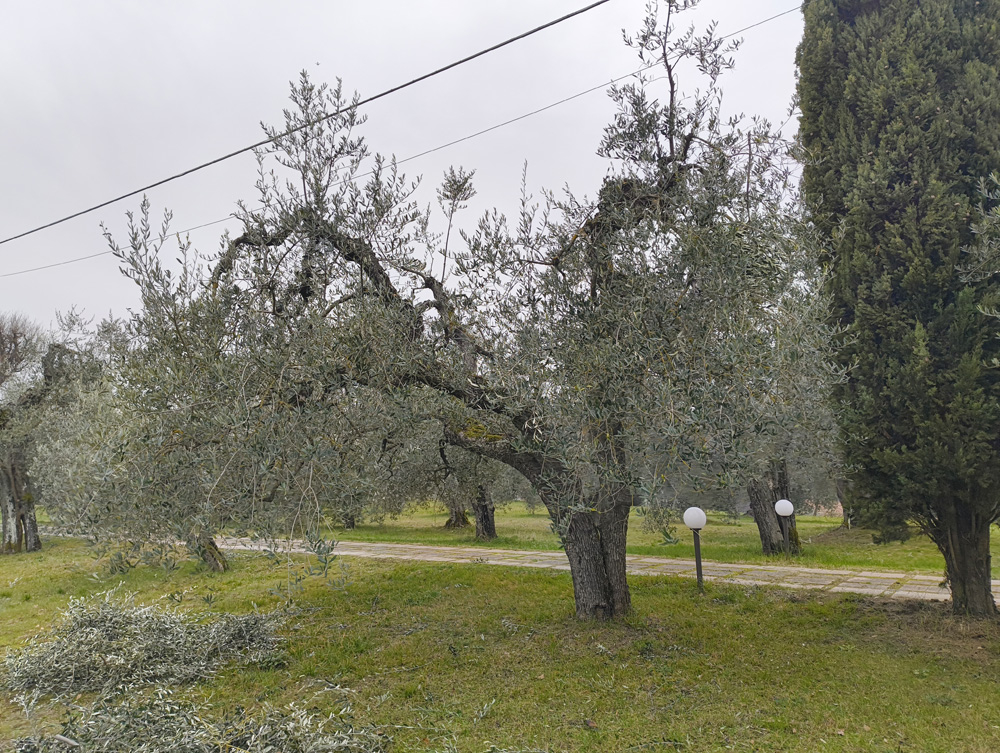


Moving on from land work I wanted to send this brief Ezine out just to reconnect in the New Year. 2025 proved to be a positive year for our investment accounts and it is anyone’s guess what is in store for 2026.
I am attending the Spectrum IFA Group annual conference from the 26th to 30th January and will be doing my usual round-up Ezine when I get back. We will be speaking with Rathbones Asset Management, Evelyn Partners, Prudential, New Horizon Asset Management, LGT Wealth Management and others as well.

But, before I return (hopefully Greenland will still be a part of Europe by then) I wanted to share some information on Italy with you, as a light hearted read.
On Facebook I follow a page called Dataroom di Milena Gabanelli. You may know of her from the programme ‘Report’, which is where I first became familiar with her around 15 years ago. Now she works for Corriere della Sera and has her own FB channel. It’s very interesting as they regularly put out content about Italy and global events but backed up with solid facts.
The most recent one I saw was ‘Chi paga meno tasse’. A look at the health system and exactly where tax revenue is coming from to support the system itself.
The following is summary of the video, which is only a few minutes long, but provides some quite interesting information, which I wanted to share with you.
(The data is taken from studies of contributi previdenziali relative dichiarazione 2023.)
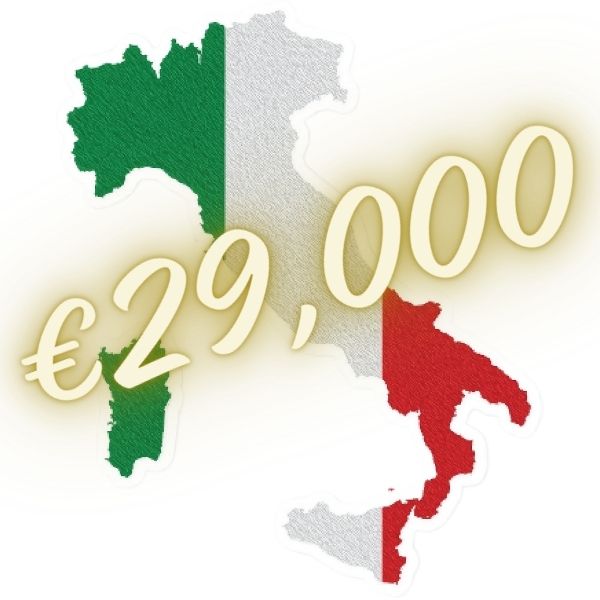
Did you know that 76% of taxpayers in Italy declare less than €29000 gross per annum.
This group do not pay towards the health service because they are exempt. Their income is below the threshold set by the Italian government. (The ticket)
9% of taxpayers in Italy declare between €29000 and €35000 gross p.a.
This group pays for health expenses but not for welfare (pensions and schools!).
Only 15% declare over €35000pa.
This group contributes to both the health system and the welfare. They pay for the majority.
Let’s analyse things a little further
With an income of €29000 gross pa there is likely to be very little margin to pay your health care expenses. In this category fall many ‘pensionati and dipendenti’ and so we can exclude them for the purposes of the analysis.
The rest are autonomi ( self-employed people- like myself)
- 1.8 million autonomi in Italy are on the flat tax regime and so cannot be considered.
- 2.2 million autonomi pay IRPEF (normal income tax rates) and of these 1.3 million declare income under €29000pa. This means that they pay €2 billion in tax or ONLY 8% of the whole category for the autonomi.
To analyse further to see whether any of these people have a real need or if they are working in nero, we can look to the index ISA which looks at fiscal ability to pay. They work on a points based system and if a contribuente has under 8 points then there is the risk of fiscal evasion.

Tax Evasion vs Tax Avoidance
Here we have some interesting facts:
- 78% of restaurants declare less then €28000pa gross
- 70% mechanics under €20700 pa gross
- 60% alimentari under €10700 pa gross
- 48% hairdressers under €11900 pa gross and also 45% of balneari
Anyone who is declaring less than they actually bring in is also paying less contributions towards the health service and also they will receive less pension, which means that the people who are paying will have to pick up the bill.

The Agenzia delle Entrate are not funded well enough, even though they have some interesting tools at their disposal, and can do controls on only 4.5% of people / businesses annually.
It’s no surprise that the Italian government really doesn’t have much, if any, room for manoeuvre to change tax rates and why the health service is underfunded.
Short term rentals
If you like those facts you may also like the following ones about the explosion in short term rentals in Italy (affitti brevi), which go some way to explain why many cities and famous locations in Italy are now almost impossible to visit without a tremendous amount of people all doing the same.
- In 2011 short term rental advertisements didn’t exceed 20000 in the whole of Italy
- In 2021 this number had exploded to 620000
- In 2022 to 644000
- and 2023 to 700,000 which equates to approximately 11 billion euro invoiced a year
In the market of short-term rentals Italia is No 3 in the world behind the France and the USA!
If we analyse some of this data then we can see that 75% of these rentals are in the hands of private landlords and 25% managed by agencies.
Agencies, in general, retain 35% of the income to manage the cleaning and change of sheets etc. Almost all of the advertisements are now on the digital platforms like AirBnb and Booking.com, who in general keep between 14 and 18% of the income. The same platforms have been obliged since 2017 to apply a withholding tax of 21% on gross income.
In the Legge di Bilancio 2026 this withholding tax of 21% now applies to the first property. For the second a witholding tax of 26% and for owners of 3 properties or more, they are now deemed to be a business activity and must open a partita IVA (VAT position). The war on private landlords continues, not just here in Italy but across many countries, but whether it will make much difference in the long run is anyone’s guess.

If you have enjoyed this information so far, then I will leave you with the world of Italian politicians and how they are paid (c/o Dataroom di Milena Gabanelli)
They are paid well because they should, in theory, not be corruptible and should work in the interests of the country.
An Italian politician is entitled to a number of benefits, ranging from:
Indennità parlamentare, which is a compensation payment for being a politician and spending time away from home. It is currently €10435pm Gross or €5000-5300 pm after taxes and contributi.
Diara (per deputati e senatori) – just €3500pm
+ Expenses reimbursement.
These do not always have to be documented!!!!
They also qualify for reimbursement of travel expenses
And reimbursement of telephone expenses
Pensions
The same politicians are entitled to a pension after only 5 years of working in Parliament. (versus 20 years for the rest of us!)
Interest payments
They are also entitled to an interest rate of 5.4% on the money in their savings and current accounts. The bank pays this automatically versus the average rate for us , at about
0.2 %
And on that note I will leave it there. This Ezine was really was meant to be a light-hearted way of staying in touch.
I will be following this up from our conference with a market review from the week after next, followed by some other Ezines on tax and also organising your affairs for your loved ones.
Fraud and cyber-security
By Andrew Lawford
This article is published on: 14th January 2026

It’s time to pay (even more) attention!
We all know that we have to be careful when we are dealing with financial matters, especially when we are online.
I appreciate that this isn’t news to anyone, but it is easy to become complacent, as well as to fall behind in our awareness of the sophistication fraudsters have available to them in the era of Artificial Intelligence. I honestly think that we are all vulnerable to frauds, but if we have the humility to admit this, we can better protect ourselves against the most common pitfalls.
I recently watched a webinar made available by Cazenove Capital in the UK and whilst there were things in it that I already knew, I must admit that it also opened my eyes to how frauds are developing as well as reiterating what our best practices should be online and when dealing with financial matters generally.
I would strongly suggest that everyone takes the time to watch the full webinar, but here are a few bullet points that we all need to reflect upon:
- The golden rule in life is that if something seems too good to be true, it most probably isn’t true. However, human nature means that it is a good idea to be reminded of this fact on a regular basis.
- Most frauds are still relatively “low-tech” and involve things like hacking e-mail accounts – the fraudster may monitor e-mail traffic for a while before finding their opportunity, maybe by sending messages from your e-mail account to financial institutions you deal with. Two-factor authentication is an excellent protection against this possibility – if you don’t have it set-up on your e-mail accounts, do it now!
- Be careful clicking on links in e-mails you receive! These communications seem ever more credible nowadays and can easily trap the unwary.
- Any financial transaction that someone is urging you to carry out in a hurry should instantly raise a red flag. If you are being pressured to transfer funds, even by someone you know, hang up the phone, take a few deep breaths and call the person back on a number you know can be trusted. If you aren’t sure what to do, seek counsel from someone you trust who is not connected to the situation at hand. Deep-fake calls are a possibility (where it will appear that you are speaking to someone you know), but there are also cases where people have been contacted by complete strangers who claim that a family member is in trouble and needs money transferred in a hurry.
- If you do expect to have to make urgent payments to someone – maybe a family member or a business associate – use code-words or agree a protocol that only you and the person concerned will know. Agree in advance which accounts any payments will be made to. SEPA transfers in the EU will now confirm the identity of the beneficiary account holder – if your bank flags up any discrepancy between the name you have entered as beneficiary and the actual account holder, take time to check!
What is Spectrum doing to protect me?
For some time now, all Spectrum advisers are required to conduct video calls or in-person meetings when processing withdrawal requests from any investments we intermediate. The fact that withdrawals generally take some time before being paid out also takes away the threat of panicked decisions being made. Of course, one day deep-fake videos will likely become a reality and so even video calls may not be trustworthy, but for today this procedure will protect against all but the most sophisticated fraudsters (and these aren’t the ones who are targeting the likes of us – they will be defrauding multinational institutions).
We must make our job that of being a harder nut to crack compared with those around us. Rather like home security alarms: they will not be sufficient to stop the world’s most sophisticated thief, but they will be enough to make the opportunistic criminal move on to an easier target.
If you find yourself confused or worried about any of the above, please don’t hesitate to give me a call to discuss. The more we are aware of the risks we face, the better we can protect ourselves.
Hoping for wellies! 2025
By Gareth Horsfall
This article is published on: 24th December 2025

It’s Christmas again and how the time flies!
I am hoping for a new set of wellies this year because the emergency pair I bought when we purchased the property didn’t last very long at all.
I sent out a not-so-subtle message to my wife and so I hope my Christmas wish comes true.
I will then be able to also complete my true Yorkshire look in Umbria.

I hope you have a very Merry Christmas and Happy New Year, whatever you are doing.
We will be relaxing at home this year. My Mum has just been for a few days to visit (she hasn’t seen the house since June 2024 when we were in the phase of renovation) and so it was good for her to see it for herself. We are now on our own, but have lots of fun things planned. My son will be playing in the local Pasticceria Russo, in Amelia, this evening (23rd) , playing one of his newly learned Beethoven classical piano pieces.
The Pasticceria is becoming a bit of a focal point for us in the area (as it seems to be for alot of other people as well) and they have their amazing range of sweets and Panettone artiginale, which is a little bit too more-ish for my liking. I am trying my best to resist the temptation and am doing OK, until now! The only way to combat that is to engage in more physical land work anyway. As many of you have told me since we moved here: ‘there is always work to do on the land’.
It will keep me out of trouble until I am back into work full-time in the New Year.

Italian tax and finance update | November 2025
By Gareth Horsfall
This article is published on: 20th November 2025
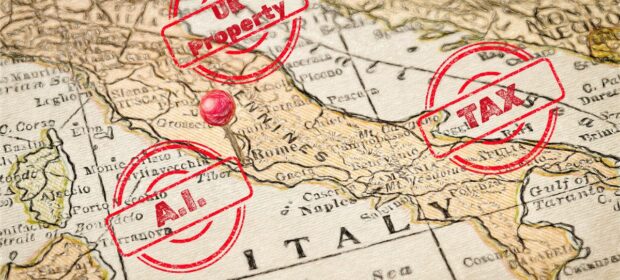
I have a few things I would like to write about in this Ezine. In the last month or so a number of questions have arisen from clients and people who have contacted me, re tax and investment markets, AI, the UK property and much more. So, I thought I would try and address a few of these in this Ezine.
However, before I do that I thought I would give you the quick update on the new house and I say ‘new’ house but we moved in on August 7th 2024 and so it’s now been over a year and the house itself is largely done, save for some bits and pieces to do but which can be done when we have the time and energy and money to do so.
The thing that I am still very much learning is the management of the land :2025 was the first summer when I saw the full cycle of the fruit trees. I was explaining to someone recently that I didn’t actually buy any fruit from the fruttivendolo from about April until about 2 weeks ago because it has been a continuous fruiting, one after the other. Now, I just have some of the last cachi (persimmons) hanging off the tree but that’s it and learning the cycle of what grows and when they flower, fruit and when to harvest is quite interesting. I remember that the nespola (medlar) tree and almond tree flowered very early last year, in February if memory serves me correctly (I think I may need to start a diary!) and so given both of those trees need a good trim this winter (I never got round to them last year), the question is when to do it? My hunch is anytime now given we are in the ‘riposo vegetale‘ phase for plants, but anyway these are the kinds of decisions which haunt my dreams. LOL !!
With the recent spurt of rain and then the return of the good weather, the grass has had another growth spurt and I will need to give that another trim before the winter hibernation, more than likely. I should also mention that I harvested my first bietola (chard) last night. At the end of September, I popped to the local garden centre and bought a variety of seedlings and at last light of the day, around 7 pm dug a few channels in the land and planted my first ‘orto’ or as I like to call it the ‘orticino’. (See the photo below). Hardly very exciting, but I thought I would give it a go.

If you are interested in the crops, the list is as follows: porro (leek), winter lettuce (2 types), rapa, finocchio, broccoletti, carciofi (artichokes) and bietola and it was pretty much experimental for me and as you can see is quite messy in fact I haven’t had time to do any fancy bordering or anything like that because it’s in the middle of a patch of land where I haven’t even got around to cutting the grass from summer yet. Anyway, it’s all good fun and nice to have fresh bio veg available although slugs and snails are having a field day and most of it is pottered with hole ….but I am working on that!
Otherwise, I have understood that the summer period, May to September, is mainly for watching everything grow…quickly! Particularly, those things that you pruned in the period from October to April with the hope that this year’s crop will be better than last year’s, but never really knowing what nature will bring it’s like gambling and not knowing the odds. Writing it down it sounds a ridiculous waste of energy, but seeing the literal ‘ fruits’ of your labour is somewhat deeply satisfying…
Not wanting to turn this Ezine into a country side Q&A newsletter, I will move swiftly on from life in rural Italy and onto money matters.
As I said there are a few things which I wanted to mention in this E-zine and the first of which is one of my favourite subjects: The Agenzia delle Entrate.

I have been contacted by a number of people since September who have received letters from the AdE, this would not normally picque much interest for me because the AdE send regular letters out to try and weed out potential errors or omissions from your tax return in fact I have had a few myself over the years.
However this letter was of particular interest because it broached the subject of residency and non declaration of assets, at all, ever.
Over the years I have seen many times where someone has made a tax declaration, but where errors have been made and / or omissions, and the AdE have eventually caught up with the error and the individual concerned has had to correct the error, pay the back taxes and penalties. Fair enough mistakes happen and often through bad advice on the part of the commercialista but one category of people who seems to have evaded the oversight of the AdE were those people who are resident in Italy, and for one reason or another have never made a tax return here. The main reason is because they were badly advised by a commercialista to not ‘enter the system’ or that they were declaring in another country thinking that it wasn’t necessary to do so in Italy.
However, it may look like that particular issue has been uncovered by the AdE, in fact, in a short period of about 5 weeks, I had 6 people contact me, all with very similar situations, relating to not having filed for taxes in Italy and subsequently receiving a letter from the AdE asking them to visit their local AdE office and explain the anomaly.
Whether this is an awakening for the AdE for merely just a blip is anyone’s guess but I suspect they have finally got the right hand speaking with the left hand and they will weed more of these issues out in the near future. It all corresponds nicely with the change in definition of residency from Jan 1st 2024 and so is probably the start of a wider push to make sure that everyone is doing what they should be, whether they know it or not.
So, in short, if you are resident in Italy then it is more than likely that you should be declaring your financial situation for taxes each year, if a commercialista tells you that you shouldn’t or don’t need to file, then you need to question that and not just take their word for it. I would request written, signed confirmation that this is the case. Equally, filing for taxes in another country, thinking that this is sufficient, is generally the wrong thing to do and you may want to explore this further to avoid eventual contact from the AdE.
If you happen to be in this situation and are wondering what steps to take, do not hesitate to get in touch. I have helped many people through this situation in the past, it’s better to address the matter before being picked up by the AdE.

Now, let’s move on to the subject of the UK property market.
“Property is the best investment”
I don’t know how many times I have heard this said to me in my career, which has spanned an era when property investment probably has been one of, if not the best investment to make.
However, everything is cyclical and whilst UK residential property may have been a great investment, that doesn’t mean to say it will be forever. In fact, the UK property market has stalled, at the time of writing, and it remains to be seen whether it is just a pause for breath or part of a longer period of downturn for the UK property market. As I have repeated many times in the past, in times of needs, governments will turn to the real estate market to generate tax revenue because it is has been the go to investment of choice for most people. The UK budget will roll around at the end of this month and we will see what kind of moves Rachel Reeves makes on the UK property market, it is expected that she will tax properties over a certain value, but little is known at this time. (I spoke with an investment manager in London recently who said they are bracing themselves for a ‘brutal’ budget, were his exact words).

However, as usual these are just my musings.
To explain in a bit more detail Rathbones Investment Management recently wrote a great article for a professional publication and I thought to share this with you here.
The UK’s love affair with property investment is apparent across newspapers, daytime TV and social media. An English person’s home may be their castle – they’ve also regarded it as their nest egg (and the same for other Britons). Many have even bought additional castles, such is their ardour for property. Reflecting this, official figures show more than 2.8mn private landlords in the UK.
However, the days of strong returns from residential property are already past. The past decade has seen three pieces of bad news. House price growth has been slower; higher interest rates have squeezed the buy-to-let business model; the regulatory treatment of private landlords has become progressively less favourable.
The economic and policy outlook suggests those headwinds won’t dissipate. From 1980 to 2016, UK house prices rose 6.7% per year in absolute terms, or 3.3% in real terms (after allowing for inflation). Prices in London rose even faster: 8.5% in absolute and 5.0% in real terms. That rate of capital appreciation is considerable – and investors making an income from renting out properties would have made even more.
It’s difficult to compare returns from property exactly with returns from other investments, for various reasons – such as the cost of mending that leaky roof. But taking the crude numbers, the capital appreciation of a portfolio made up of 25% UK equities and 75% international equities would have been only slightly higher at 9.0% per year or 5.5% after inflation.
What drove high house prices?
What lay behind this? One cause is higher wages. As earnings have risen in real terms, households have been able to spend more on housing.
Between 1980 and 1998, the average UK house price rose by 2.6% above inflation per year. So too did the average wage. As result, the house price-to-earnings ratio – the average house price divided by average earnings – was similar in both years, at around 4.3, although it did fluctuate a lot between these two points.
However, since 2000, the ratio has risen to as high as 8 and never fallen below 6. So pay can’t be the whole story behind the price rises.
A fall in interest rates helped sustain higher house prices relative to earnings. Double-digit mortgage rates were the norm in the 1980s and early 1990s. But these dropped to as low as 1–2% by the late 2010s. This shift allowed buyers to borrow a lot more money for any given level of monthly repayment, bidding up house prices.
Other changes to the mortgage market have probably helped push UK house prices higher, by increasing the availability of loans and encouraging property investment. These include the entry of banks into the mortgage market, the introduction of buy-to-let mortgages, and market innovations, such as the government’s Help to Buy scheme.
Moreover, housebuilding has failed to keep pace with population growth over the past fifty years or so. In other words, demand has risen faster than supply.
Productivity, rates and policy
But conditions for house price growth now look much less fertile. After a period of far outstripping inflation, average earnings have grown much more slowly lately. Even if we ignore declining real wages in the early 2010s, they’ve only outpaced inflation by 0.5% a year since 2016. In the long run, real-terms wage growth is closely linked to productivity – companies generally only pay their workers more if they’re getting more from them. But productivity growth has in recent years been low – and we don’t foresee a dramatic improvement anytime soon.
Moreover, mortgage rates have risen in the past few years. The average 2-year fixed-rate 75% loan-to-value mortgage rate has climbed from 1.2% in 2021 to above 4% since 2022, according to the Bank of England. This has pushed up first-time buyers’ repayments. We don’t see a return to the abnormally low interest rate environment of the 2010s.
On top of higher interest rates, unfavourable tax changes and tighter regulation have added to costs. For example, stamp duty on additional properties was hiked in 2016 and again in 2024.
Moreover, the housing supply pipeline is flowing better. Although the government has fallen short of its housebuilding targets for years, the annual net increase in dwellings has crept back up since 2015, returning to above 200,000. On this measure, the housing stock is growing at the fastest rate since the 1960s.
End of the affair
With those fading tailwinds in mind, it’s little surprise that UK house prices have risen by a much more pedestrian 3.7% per year, in absolute terms, since 2016. That’s only about the same as inflation. Over the same period, the portfolio of UK and international equities we mentioned earlier rose by 7.2% a year.
We think this trend will continue. In our view, it may be time for the British to break off their love affair with the housing market and embark on a new one, with a diversified portfolio of financial assets. After all, 10- year UK government bonds offer yields above 4% and there’s a wide selection of high-quality names across the world’s stock markets. It might not be the most romantic of trysts, but we think it’s likely to offer them a better return in the long term.

Are we in an A.I and tech stock bubble?
For those of you who can remember as far back as the year 2000, as an investor, you may remember the investors favoured around the possibilities of the introduction of the internet (I think we were still working on dial-up connection at the time and my phone was probably a Nokia 3310. The world of today’s smart phones was about another 8 years away, when the iPhone first launched). I remember being at a business meeting in Geneva in 2005 and there was talk of being able to call over the internet from your phone in the near future and being able to answer emails more easily on your phone.
Little did we know how far we would come so quickly ! In the year 2000 there was much hype about this future and that fuelled what is now called the ‘tech boom’ in dot com stocks. Inevitably, this created a bubble in dot com stocks and a subsequent crash in the markets when investors realised a lot of the hype was largely based on fresh air and not much substance.
I have been asked quite a few times in the last month or 2, about the possibility of something similar happening in AI and tech stocks today.
It must be said that the circumstances are quite different this time round. Companies are actually profitable in 2025, and A.I will create problems in the employment market, but also deliver productivity gains.
(Interestingly, I saw an article the other day saying that Italian companies who had laid off employees to benefit from cost and productivity gains from the introduction of AI systems, were doing an about face and re-hiring those same workers because they realised that AI was not going to deliver all those gains which they had been promised).
Anyway, rather than writing a long discourse on the topic I asked Chris Saunders of New Horizon Asset Management what he thought, on this short video with my question and his answer. I hope you find it interesting.

IRPEF (income tax) rates set to drop again!
As part of Giorgia Meloni’ s government’s promise to the Italian people, IRPEF ( income tax) rates would be simplified and even reduced with their long term goal of having a much more simplified tax system ( good luck with that Giorgia !).
In the Legge di Bilancio 2026, which is currently being debated in parliament, they have proposed to reduce the second progressive rate of income tax, which currently sits at 35% for gross income between €28001 and €50000pa, to 33%.
Now, as I have often been heard saying, they are just playing around the margins and this kind of tax reduction will hardly have any real impact for most people who might be struggling with higher prices of the last few years and facing a continued erosion of their income. However, it is still something and in line with the promises made by the current sitting government. (At time of writing it does look like this will be approved and implemented from 2026).
Possible increased tax on rental properties?
This is the one that is creating the greatest political friction at the moment and, so what is it?
The proposal is to increase the cedolare secca tax on rental properties from 21% to 26% from 2026.
Cedolare secca 21% is the tax that is paid on rental property income, where selected, and is a kind of forfeit rate. The income from cedolare secca is not taken into account when calculating your other total income subject to income tax (IRPEF) and so is quite attractive for most. There are some disadvantages, which I won’t go into here because in the main the 21% tax rate is the go to option for most. However, it is proposed to bring this up to 26% on rental income (for private renters, rental agencies and rental agencies online).
As per the UK, see above, real estate is a go to cash cow for governments when they are looking to raise revenue and so this move (although likely to be watered down or removed altogether because Forza Italia are not in agreement and will not vote for the proposed change) is something that we will likely see happen more often.
If, as may be intended, it is being introduced to cool the housing market and, especially in the big cities, cool the rental market itself, I am sceptical that it will have an effect at all. Having lived in Rome for the last 20 years and seeing the explosion in the Airbnb apartment for rent, and the constant stream of tourists to occupy those places then I can’t see that an increase of 5% will hurt that much, other than those who have high debt levels to service.
Anyway, it’s something worth watching, in case you have a rental property, or part of property in Italy which you are generating income from.

London’s attractiveness as an International financial centre.
There has long been talk of London being one of the world’s premier financial centres and for some time, I think, it held the No 1 spot for a period as well, however, that would appear to be changing.
On one of my economist social media feeds, I saw these graphics recently which I thought I would share.
An IPO (Initial Public Offering) is where a private company decides to list on the public stock exchange so that it can raise capital and offer its share to investors. They normally choose to do this when they reach a certain size, as a way of accelerating company growth. In which jurisdiction they do this is important because it can generate a lot of revenue for the financial sector in that country, create jobs and also secures the attractiveness of the financial centre as a place that is deemed safe and secure to list publicly.
London used to be one of the preferred jurisdictions, but as you can see, in 2025, that is no longer the case. London now holds spot No 23 on the list behind some important newer entries, such as Hong Kong, China and India.
What this says about London’s long term future is anyone’s guess but it is interesting information all the same. (Could Brexit have played a part?) . It probably says more about the ever increasing importance of Asian economies and the continued importance of the USA.
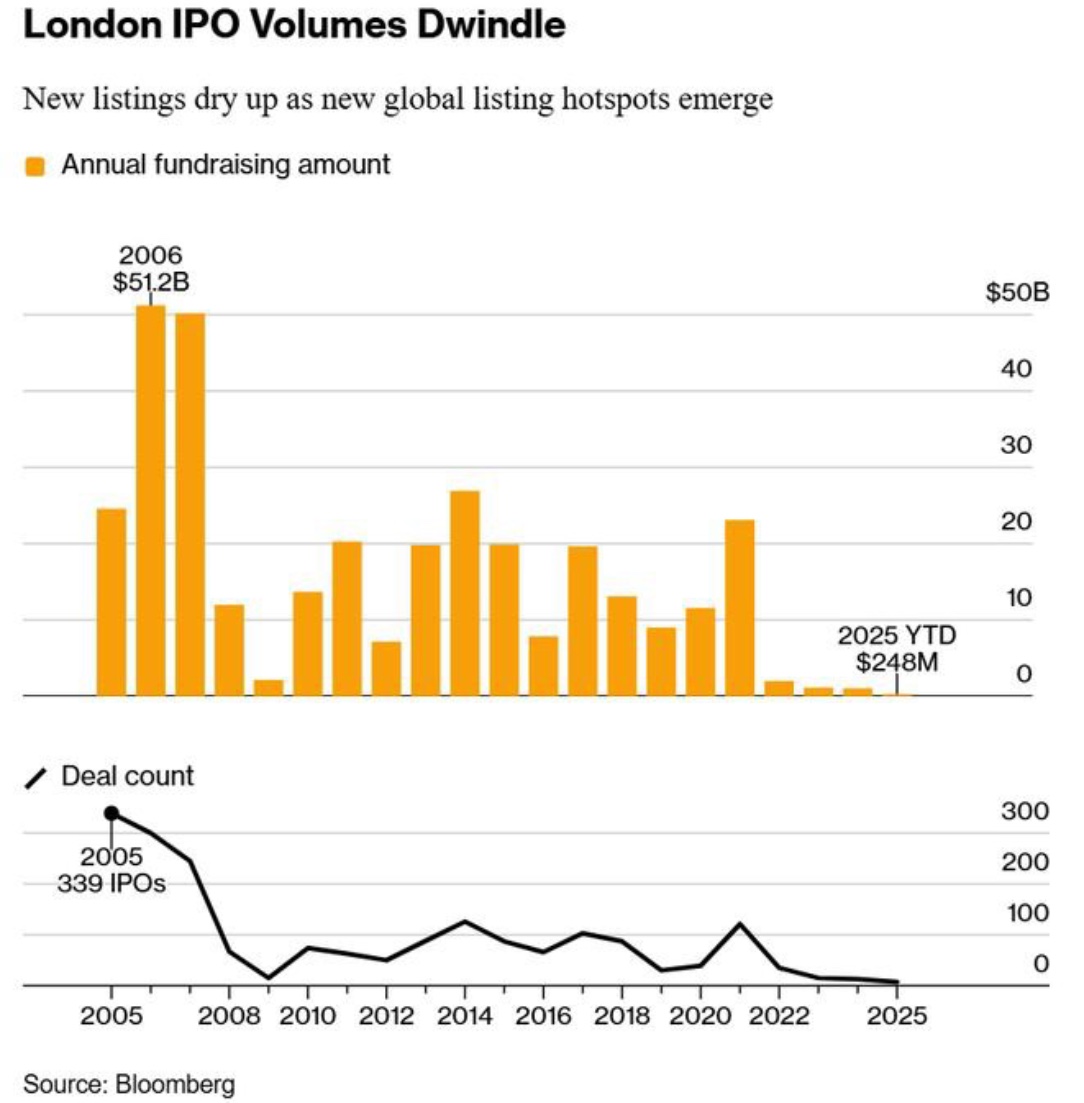
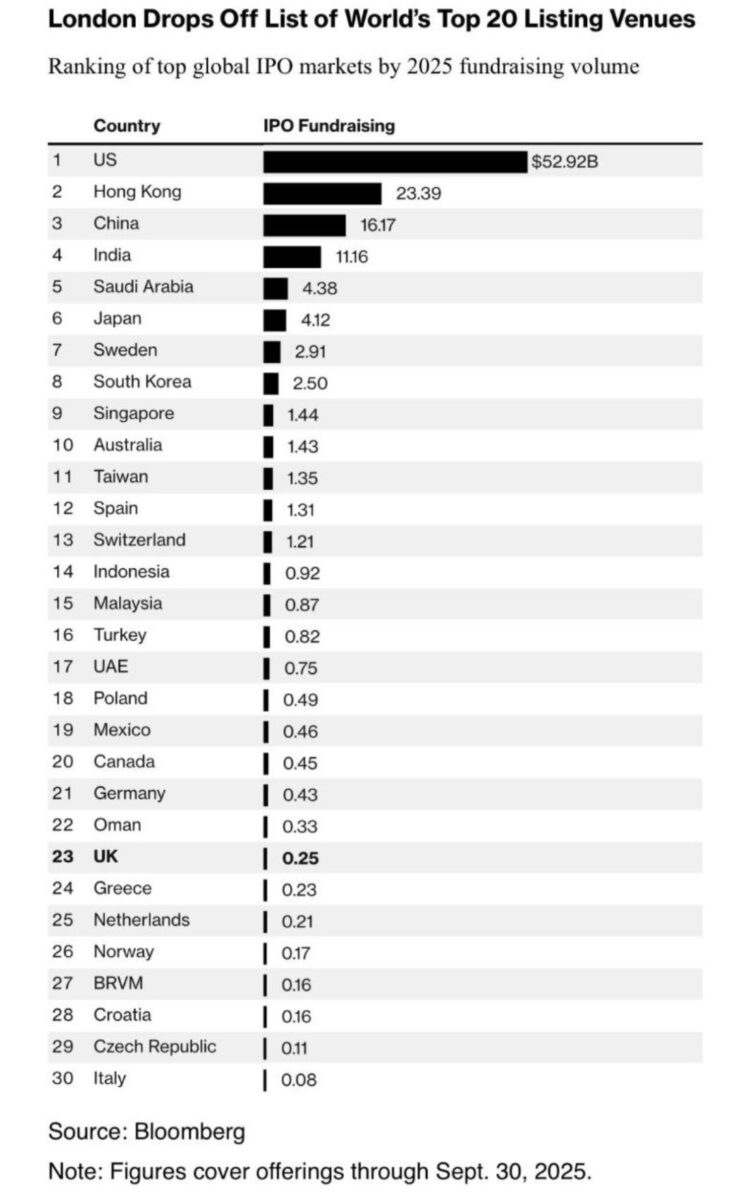
Spectrum IFA begins Employee Ownership for a Sustainable Future
By Spectrum IFA
This article is published on: 14th October 2025

Empowering People, Ensuring Continuity, and Deepening Commitment to Clients
At The Spectrum IFA Group, our success has always relied on our people, their expertise, dedication, and a shared belief in doing what is best for our clients. As a firm founded on trust, transparency and building long-term relationships, we recognise that sustainable growth depends not only on sound financial advice but also a solid grounding in joint ownership and responsibility.
Since its inception, Spectrum has aspired to share company ownership with its advisers and staff. Establishing a clear succession plan is essential, not only to ensure business continuity but also to provide long-term security for our advisers, employees, and most importantly, our clients.
Today, Spectrum’s advisers and staff collectively hold over 15% of the company’s share capital. This initiative reflects our belief that those who contribute daily to looking after our clients’ interests should also participate in the company’s growth. In 2026, Spectrum plans to increase employee and adviser equity participation to approximately 30%. Our longer-term intention is for advisers and employees to own 48% of the business, with the remaining 52% retained by the founders.
This approach demonstrates our commitment to creating a resilient, people-focused organisation where everyone has a vested interest in delivering exceptional advice and service. By aligning ownership with those who directly support our clients, we are securing our longevity whilst embedding the long-term continuity of relationships that help define our unrivalled service standards.
At Spectrum, we view this as more than simply an exercise in restructuring company ownership – it reflects of our core values. We are building an organisation that empowers people, rewards dedication, and safeguards the future security of our clients, advisers, and employees alike. Together, we are shaping a stronger, more sustainable Spectrum team for generations to come.
Financial update Italy – September 2025
By Gareth Horsfall
This article is published on: 8th September 2025

Hello again and welcome back to my Ezine after the summer break. I hope you are well and that the somewhat fresher Italian summer was a surprise for you as well. We were not sweltering in 38 degrees this year but enjoying a more pleasurable low 30s for most of the summer. It was a welcome change from last year, for example, when I saw the last rain in mid-May and not again until mid/end Sept.
It was also my first holiday away after our change of lifestyle to the country and with all this land, trees, and plants to manage. I have to say that although time at the beach was great and a welcome break from the country, I did find myself wanting to come back and see how all the plants were doing and also how the olives were developing after lots of summer rainstorms. It was pure curiosity because on my return I found that the whole situation is largely as it was last year at the same time. Grass needs cutting, and a few other jobs need doing, but in general everything is coming along nicely.
For those of you with whom I am friends on FB, you will have seen that I came back to a bumper crop of apples, pears, and figs. The figs are finding their way into my pancia quite quickly and are super delicious. (and I have my new wicker basket for collection – which my wife jokingly bought me at a ‘sagra’ event recently, very Laura Ashley)

Amelia is famous for its figs, so it’s no surprise that the trees are full of fruit again, exactly the same as last year. The apples and pears, I have now discovered, are different varieties and were pretty much falling off the tree, so I harvested the rest and they have now gone into cold storage until I can get round to doing something with them. (My mum reminded me that my grandfather used to sell fruit and veg and, to preserve fruit, he used to wrap each single piece in newspaper and then put them in cold storage somewhere. Apparently they kept for a few months.
Mine have gone into the underground cellar, which hosts the resident bats. It maintains a constant temperature of about 12 degrees all year round. They can stay there until I get round to dealing with them shortly).
The break also gave me some nice time to reflect on landscaping, round No. 2, this winter. I have made some decisions on some trees which are currently unmanageable. I think I will be lopping off the tops and starting to prune them again into smaller and much more workable trees. Also, I had some ideas about other landscaping possibilities, but one step at a time. Of course, there are the olives to deal with in a couple of months and they seem to be coming along just fine, although the mosca has attacked many this year due to the cooler and wetter summer temperatures. Also, after a serious potatura in the spring, the fruits are fewer than last year. I just hope that the oil content is higher. It’s all a big learning curve!
So now my country life update is out of the way, onto the financial context of this Ezine, but before that I also wanted to share with you some rather disturbing news which I think you should all know about, whether a client or not……..and to watch out for.

Fraud and AI
Earlier in the year we introduced some new security protocols regarding withdrawals from policies/portfolios which clients hold with us. We had been made aware that another financial planning company operating in the Middle East had received a fraudulent request to withdraw funds from a client portfolio. But in this case it turns out that it wasn’t the client making the request, but in fact some Artificial Intelligence application. The worrying aspect of this was that the adviser was contacted directly by the client on WhatsApp and email asking to withdraw a sum of money and have it paid to their nominated bank account. The adviser had an exchange of messages with the so-called “client,” not suspecting anything untoward. When the money had been paid, the actual client rang to ask the adviser why money had been deducted from his portfolio.
I think you can probably understand the ins and outs of this situation. It was a fraudulent approach using Artificial Intelligence.
AI certainly has its positive uses (I have translated some of the content in this Ezine from Italian to English which used to take me a long time, but was done in 3 seconds). However, this is certainly one very dangerous and worrying angle.
Therefore, since the start of the summer The Spectrum IFA Group have introduced a policy of meeting with the client in person or, if not possible due to geographical restrictions, then an video call with documentation required, where a withdrawal is requested. A phone call is not acceptable, nor purely communication via message or email.
We have introduced this to protect our clients and will keep track of the situation as and when we hear more. However, whether you are a client or not, please be alert to messaging and emails when dealing with your financial affairs. Try and engage either in person or via video call ONLY. Do not assume that messages or emails are from the actual person. If in doubt, pick up the phone and call!
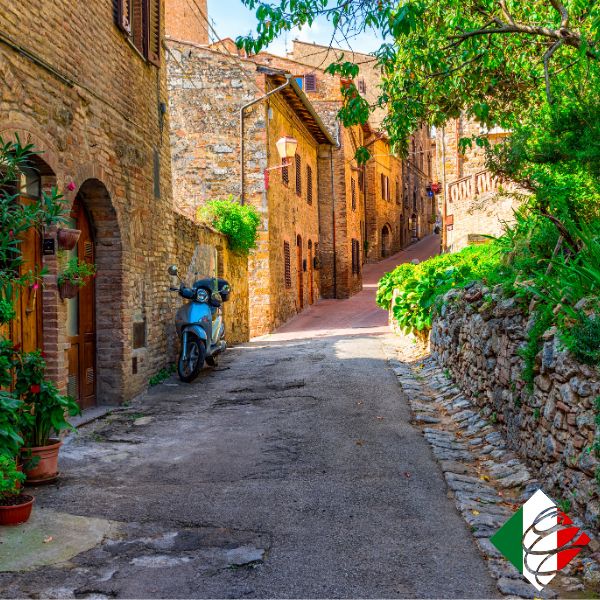
Capital gains tax on the sale of property in Italy
I am not sure why, but like buses, the same query seems to crop up multiple times at the same moment, and so it happens that I received a number of queries this summer around the capital gains tax on the sale of property, as a resident in Italy and specifically the implications of selling property either in Italy or abroad.
So let’s look at the details…
The baseline rule is that if you are a resident in Italy and you sell a property after the first full five fiscal years from purchase (not your Prima Casa – different rules apply here, read on for details), you are NOT required to pay tax on any capital gain (CGT) resulting from the sale. This applies to properties you hold in Italy or abroad and applies whether it is your 2nd or 15th property!
This stems from the idea of a speculative intent to buy/sell property and where there is no intent then capital gains tax is not applied. (a nice tax planning opportunity!)
Speculation in Italy is defined as follows:
- the property is sold for consideration (e.g. sale, exchange, contribution to a company)
- the property is sold within five years of purchase or construction
- the property must not have been used as the seller’s (or family’s) main residence if it is a residential unit.
These rules also apply to property located abroad!
If the sale is subject to taxation (because you are selling within the first 5 years since purchase), then you can either opt for:
A substitute tax of 26% (standard capital gains tax rate) at the time of the deed (the notary is responsible for the payment), or
The standard income tax rates (IRPEF), with the possibility of using deductible and creditable expenses such as bonus edilizie, pharmacy expenses, doctors’ bills, etc. Bear in mind that the lowest rate of income tax in Italy is also 23%, so depending on your other income for the year you could fall in the lowest rate of income tax (€0–28,000 p.a.) and be able to reduce the taxable amount even further with deductions.
Below is a list of the main rules to consider:
Taxable conditions
As with all things taxation, it is important to understand the conditions:
- Capital gains tax applies as a result of property purchased, or built, less than five years earlier.
- An exemption is given for urban residential units that, for most of the time between purchase (or construction) and sale, were used as the main residence of the seller or their family. (The idea of Prima Casa)
- As well as, in all cases, capital gains realised from the sale of land that can be used for building (terreno edificabile) according to planning rules in force at the time of the sale.
In the case of donated/inherited property, the five-year period is calculated from the donor’s acquisition date.
(This is particularly important for anyone who might inherit a property from a deceased parent, for example. If you wish to dispose of the property it would be more advantageous to do so in the probate process, otherwise you may have to wait another 5 years before you could dispose of the property to avoid capital gains tax…. if any). However, if you take the property into your name and then can sell it quickly, you may avoid capital gains tax if the property value has not increased between the acquisition and sale.
Exemptions
Exempt from taxation are:
- Sales of properties used as the seller’s or their family’s main residence for most of the period between purchase/construction and resale (the 5-year rule does not apply here – Prima Casa rule!).
- Sales of inherited properties (per Article 67, paragraph 1, letter b) TUIR).

The five-year rule
The 5 years run from the purchase deed (or from the later date of transfer of ownership rights).
- If built by the seller, then the 5 years run from completion of construction.
- The period ends on the date of the sale deed, regardless of when payment is made.
- Renovations or extensions do not restart the five-year period!
Speculative operations: property flipping
If you fancy yourself as a property magnate and decide to try your hand at buying, renovating, and then selling repeatedly within the 5 years (“property flipping”), this constitutes a commercial activity and in this case:
- The capital gains are taxable, and
- The seller is required to operate as a business with VAT registration and related tax and social security obligations.
Calculation of taxable capital gain
It’s a simple formula:
Sale price – (Purchase price / Construction cost + related documented costs)
Allowable related costs include:
- Notarial and accessory expenses,
- Indirect taxes paid at purchase (registration, mortgage, cadastral taxes, or VAT),
- Improvement expenses (extraordinary maintenance, renovations),
- Costs for removing tenants.
It is important to keep all documentation relating to any property purchase/sale for at least 10 years in Italy.
For construction:
- Building contracts, design fees, municipal charges, post-construction improvements.
The gain is taxable in the year the payment is received.
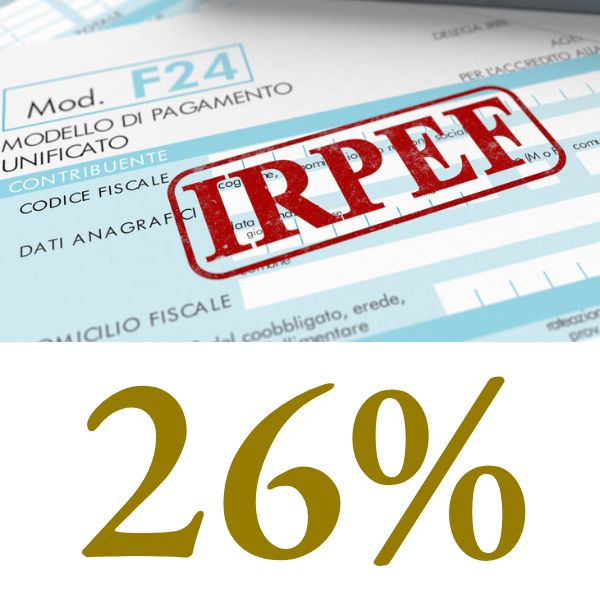
Taxation methods: IRPEF (income tax) or substitute tax (flat rate of 26%)
Capital gains from property sales fall under “other income” (reddito diverso) and you have 2 options for taxation:
- Ordinary IRPEF (income tax) – the gain is added to your total taxable income and taxed progressively (23% up to €28,000, 35% from €28,000–50,000, 43% above €50,000). Deductible and creditable expenses can reduce your tax.
This is a nice potential financial planning option because you may choose to split the tax between spouses by sharing ownership, or put it in one person’s name rather than another to maximise your lowest income tax brackets. It has multiple possibilities and should be explored should the need arise.
- Substitute tax of 26% – flat tax, applied at the time of the notarial deed. The notary withholds and pays it. No deductions/credits can be offset. This is also not subject to tax audit, so may be a preferable option for some.
Generally, taxpayers with other taxable income find the 26% substitute tax more advantageous.
Other cases
- Donation: 5 -year period runs from donor’s acquisition date.
- Built by seller: 5-year period runs from completion.
- Main residence: exempt if used as main home for most of the ownership period, even within 5 years.
- Building land: always taxable when sold; substitute tax cannot be applied.
- Agricultural land: taxable only if sold within 5 years.
- Property with buildings to be demolished: treated as building land → taxable.
- Previously subdivided property: taxation depends on whether subdivision counts as new construction.
Statute of limitations for tax assessments
The Agenzia delle Entrate can assess omitted/under-reported gains:
– Within 5 years from the year after the tax return was filed;
So there we have it. All the facts regarding capital gains tax and property in Italy. For most people I know it rarely comes into consideration because the properties are owned for more than 5 years. However, on odd occasion CGT needs to be considered. For somewhere like the UK that introduced CGT on property purchases for non UK residents, the tax interest lies in the UK and not in Italy which is a relief because you don’t have to worry about paying it in 2 places. However, if you think it is applicable to you, then take the necessary advice before you sell.
Financial update – Italy July 2025
By Gareth Horsfall
This article is published on: 3rd July 2025

Pensions, detractions, deductions and more……
I should start this E-zine with an apology that it has taken so long for me to write another one. I would never have left it this long normally, but what with recent global events and the threat of some kind of new world war, I almost felt a bit paralysed with what to write as it all seemed a bit irrelevant.
Thankfully, at least for now, we seem to be over the possibility of global armageddon so whilst we all have some breathing space, I thought I would just put some more financial planning thoughts and experiences down on an E-zine.

But before I start, I am sure you are all eager to know what I have been up to with the new home / land. Well, as many of you already know, spring time brings power to grass! It was quite something to see it grow quite so quickly. Sun and rain, until the start of June, gave it some kind of super power. However, I decided not to try and win the battle because as most people told me I would never win this one, and it would not be long before it all started to dry out with the heat of the summer (which it has now started to do) and besides that it is good for the wildlife
In the end I decided to work with it and mowed ‘sentieri’ into the long grass to allow the birds, butterflies and insects to continue to enjoy their natural habitat. I read that this is a good thing to do for the health of the land, fruit etc and actually it looks quite nice as well. Apart from a few locals who have told me that I need to cut the grass back to the floor because snakes hide in it (which kind of seems an interesting point, because I don’t really want to meet any vipers and if they have somewhere to hide and get away without me noticing them then we should both be happy) others have commented on the nice effect of being able to walk amongst the grass and see the insect life going about its daily business. Not only, but its been fun watching the various flowers that have been popping up at different times. It almost feels like they have been drawing straws. One variety seems to have its moment, then dies back and the next one appears and so on, until I guess at some point it will be so hot and dry that even they will have had enough, but still there are flowers appearing in the shady areas. This all sounds very Laura Ashley and my next step will be to buy a long flowery dress, wide straw hat and wicker basket to collect the fruit! However, land management is interesting and somethng new for me and apart from the grass I have spent time doing the fruit ‘raccolta’ and making jams with the help of my kitchen aid ‘Bimby’! Apricot, Prune, Mulberry, and cherry jams to date. Still got figs, apples and pears to go. I will keep you posted.
Other than that any kind of land clearance and tidying up has come to a stand still because it is just far too hot and so I will have to wait until the autumn to start my early morning (before I start work) workouts on the land…..and then there is the oil as well! Busy busy busy!
But, moving on from my travails, of which many of you share, I wanted to just go through a few clarifications in this Ezine which have come about due to recent discussions with clients and people contacting me and asking questions. I also wanted to share info on the tax deductions and detractions that you/we can take advantage of in Italy to help reduce our taxable burden. As it has been observed many times, unlike many countries which offer non-taxable income allowances (US and UK as examples), Italy does not. Therefore we pay tax from Euro number 1. However, Italy does also have a system of deductions and detractions which can be used to offset against income to try and reduce the tax burden. If I am being honest I can’t say that they are as good as a non-taxable allowance in terms of their effect on income, but they can be help. Lastly, I have posted some short videos on investment themes with the collaboration of one of our investment partners, Chris Saunders at New Horizon Asset Management. A way to get ideas out quickly and easily.
Pensions
Initially I wanted to touch on the subject of UK pension payments.
UK state pension.
I am not sure why but a number of you have contacted me this year to say that your commercialista is now saying that you need to declare your UK state pension on your Italian tax return and pay tax on it. This is, of course, very correct and makes me question why some commercialisti are only now waking up to this fact. It always worries me when I get a surge of the same enquiry. My concern is for those people who have been legitimately taking advice from well meaning professionals who have not been doing the right thing and will now start to file in the correct way. This could mean that the Agenzia delle Entrate will be alerted to the fact and may come asking for back payments, fines and penalties. If this is the case then they have 5 years to do so, and they have a sneaky habit of doing so about 4 years and a few months after the filing.
If you find yourself in such a situation then please remember that your commercialista has to carry insurance in the event of them mis-advising you. As long as you have the proof that they did so (which may be the hardest thing to prove because often they just provided verbal confirmation that something did not need declaring) then you can ask them to carry any costs incurred by you as a result of an error on their part. The hard part is proving it and then having that discussion with them. Check those historical emails discussions!!!
Sign the P85 with HMRC
On a similar note I recently met 2 people in the same Umbrian comune who had received a letter from the AdE which stated that they were no longer able to apply for the double taxation credit for tax paid in the UK on their UK personal / occupational pension payments. Now, this might sound like a contravention of the double taxation treaty, but as the AdE stated in their letter (which I managed to gain sight of), the correct action is that when someone leaves the UK with a pension in payment, they must apply to HMRC for gross income payments by applying through the P85 system on the HMRC website. Failure to do so means that the AdE is not obliged to offer any tax credit for tax paid in the UK and instead can charge full Italian tax. This means that you could pay in Italy and the UK until such time as you have received a gross payment authorisation from the UK: Back payments can be claimed from HMRC (where tax credits have not been awarded already) by completing the P85 form but these can take time.
In my experience, over the last 15 years, Umbria and Tuscany have always been at the leading edge of tax legislation and implementing it to the letter of the law so its not beyond imagination that this may spread out across Italy. However, there are instances in Abruzzo and Marche as well. Therefore, if you are the holder of a UK pension, are still paying tax in the UK and claiming that back through the credito d’imposta option every year, it would be advisable to apply for UK gross pension payments via the P85 claim form on the HMRC website, before the AdE refuses you the option and you end up paying twice. https://www.gov.uk/tax-right-retire-abroad-return-to-uk
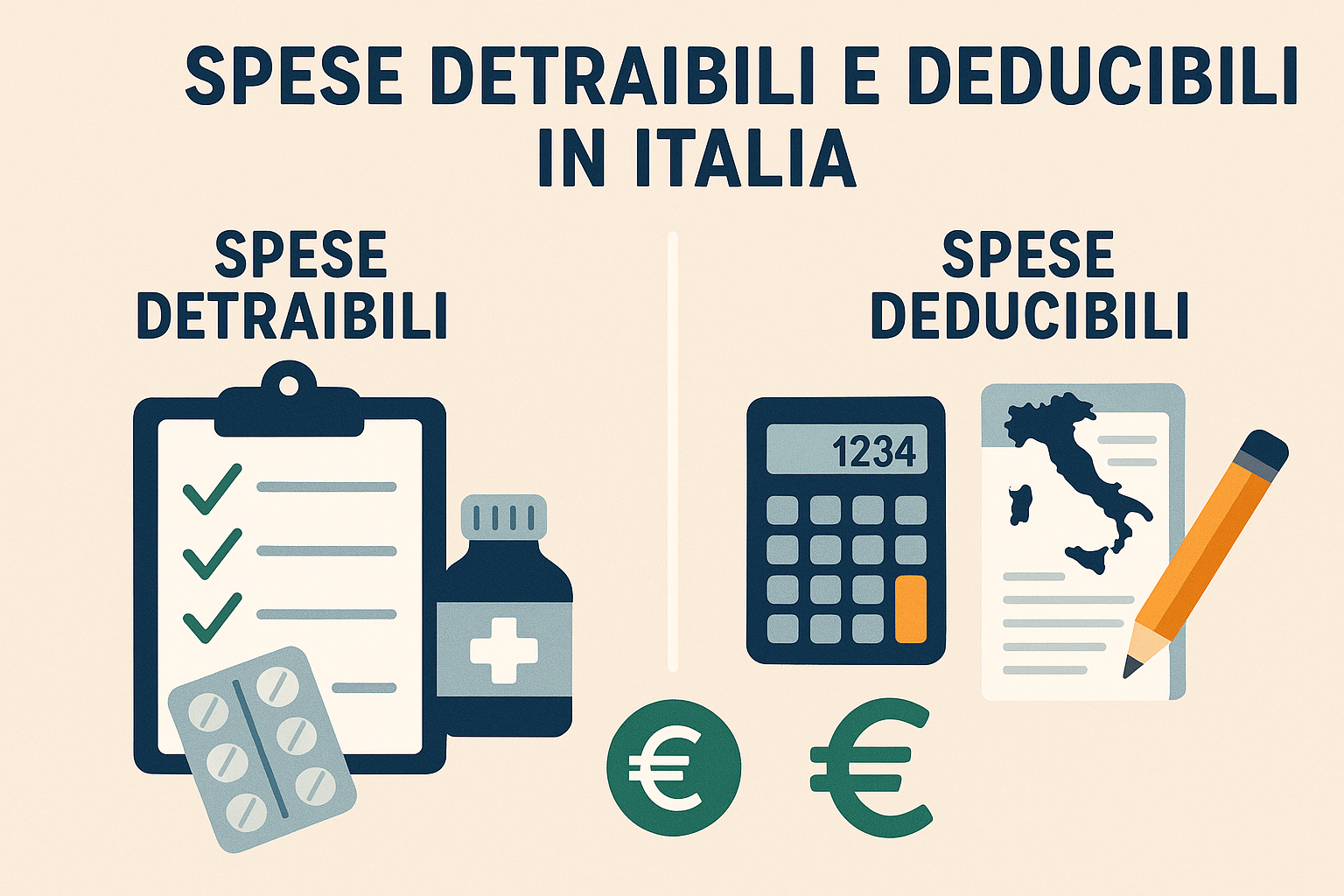
So, moving on from pensions, lets take a look at tax deductible and detractable expenditure in Italy. Annoying, as they are due to the adminisitrative issues involved, they can reduce taxable income so are worth looking into..
Firstly, it might help to know the difference between a tax deduction and a detractable expense.
- Deductible expenses (oneri deducibili) reduce your taxable income, meaning you pay tax on a lower income.
- Detractable expenses (oneri detraibili) give you a direct reduction in the tax you owe – usually a 19% tax credit on the value of item you are claiming, unless otherwise specified.
Both are valuable, and knowing the difference helps you understand how the savings work.
Healthcare expenses (19%)
Without a doubt the most common category is healthcare expenses ( detractable at 19%)
What you can claim is as follows:
- Pharmacy receipts (scontrini parlanti) showing the name of the medicine and your tax code (codice fiscale)
- Doctor visits (GPs and specialists)
- Surgeries and hospital stays (private and public)
- Diagnostic tests, X-rays, and blood work
- Dental care (e.g., orthodontics, if medically necessary
- Physiotherapy and rehabilitation
- Medical devices (e.g., glasses, hearing aids, prosthetics)
There is a franchigia related to these expenses, which means that it is only the accumulated expenses over €129.11 which are considered eligible. If your total health expenses are below this amount then you cannot detract from tax. (You cannot claim this credit if the expense is covered by insurance)
To give an example……if my total expenses are €800 during the year, then the calculation is €800 – €129,11 = €670,89, on which I apply the 19% tax credit = €127,47 tax credit.
This example may not seem much but a few years ago I had to have some urgent dental care which cost €10,000. It was not covered by insurance and so I had to pay myself. That year I had a tax credit of €1875,46. Every little helps.
So, for all those trips to the farmacia make sure you present your codice fiscale to the pharamcist and they will normally tell you whether it is an item that qualifies or not.
** FARMACIA AND HEALTH EXPENSES ARE NOW REGISTERED AUTOMATICALLY ON THE AGENZIA DELLE ENETRATE WEBSITE (YOU CAN ACCESS THE WEBSITE AND CHECK THEM YOURSELF) HOWEVER THERE ARE OCCASIONS WHEN THEY DON’T APPEAR SO MAKE SURE YOU KEEP YOUR RECEIPTS AND GIVE THEM TO YOUR COMMERCIALISTA / FISCALISTA WHEN YOU FILE YOUR RETURNS **
Home renovations and energy efficiency (various rates from 36% to 50%)
This is by far and away the next biggest category for gaining tax credits. I know myself because in 2024 we spent alot of our savings on the new home and this year we will be applying for almost all of these bonuses as tax credits.
The key incentives for home improvements are as follows:
- Bonus Ristrutturazioni (Renovation Bonus) – 50% for general home upgrades
- Ecobonus – 50–65% for energy-saving improvements (e.g., insulation, windows, solar panels)
On your ‘Prima Casa’ you can claim a 50% tax credit up to a maximum spend of €96000, spread over 10 years.
On your second home or property (other than Prima Casa) it is a 36% on a maxi psend of €96000 spread over 10 years.
(excluding boilers which burn fossil fuels, such as caldaia gas)
- Sismabonus – 50% on Prima Casa for 2025 then 36% for 2026/27 for work related to protection against sismic risks
36% on non-Prima Casa in 2025, falling to 30% from 2026/27. - Bonus mobili (e grande elettrodomestici) – tax credit of 50% on spend of up to €5000 on electrical appliances and furniture that are linked to renovations.
- Nuovo contributo per elettrodomestici ad alta efficienza – 30% up to €100 discount on electrical domestic appliance purchases, outside renovation works
- Green Bonus – 36% on garden and green area improvements.
A FEW THINGS I LEARNED BY GOING THROUGH WORKS LAST YEAR:
- All payments must be made by traceable means i.e bonifico or credit card payment. No trace, no bonus!
- If paying by bonifico then you need to use the bonifico per agevolazione fiscale option with your bank NOT the bonifico ordinario option. It asks for more info, such as the partitia IVA of the company / person you have worked with and this is needed for the bonus.
- If you employ single workmen working alone then you don’t need an authorisation (SCIA or CIA) from the local authority but if they are a ‘dita edilizia’ (this can include even 2 people working together as a construction company) then you need to have a ‘piano di sicurezza’ from an architect who will need to draw that up and provide you with the necessary numbers/reference codes. No ‘piano di sicurezza’ no bonus! (Our’s cost about €1000)
- Your workmen can apply for 10% IVA (VAT) on purchased items, but this is not necessarily a given. Our commercialista recommended that we signed a document ‘richiesta di applicazione dell’IVA ad aliquota ridotta’ for each workman / company so they would be authorised to apply for it as the materials would fall under the approved renovation works.
Insurance premiums
This is a category which people often fail to utilise because there are some questions over whether foreign insurance premiums paid can be deducted in an Italian tax return.
The policies which qualify are Life insurance, accident ( both max €530) and long-term care insurance (LTC) – (€1291)
They must qualify ( even if issued outside Italy) under the following conditions:
- Policy must be with an EU or EEA-authorized insurer (i.e. the company must be licensed to operate in the EU/EEA under EU regulations).
- The policy must cover eligible risks: life, accidents, disability, or LTC.
- The beneficiary must be the taxpayer or close family (not a third party like a bank).
- The contract must not be speculative (e.g., pure investment policies are excluded unless they include real coverage of life or disability).
I myself still insist on entering my life policies issued in the UK years ago, before Brexit, and which cover me throughout the EU and were issued whilst the UK was still in the EU. I principally have life insurance contracts with Legal and General and they provide cover across the EU. The other alternative is to take out Italian equivalent policies especially for things like health insurance. It’s worth getting a quote from one of the bigger insurance providers such as Generali (or Genertel, their online offering) Allianz, Zurich, Groupama, Unipol Sai, Banca Intesa, Reale etc
Other categories include:
Donations (19-30%)
donations to recognised NGO’s, religious institutions or universities.
Mortgage interest (19%)
You can deduct interest on mortgages for your first home (prima casa) up to a cap of €4,000 per year.
Education expenses (19%)
- Kindergarten through university tuition (both public and private, up to limits)
- School meals and after-school program
- University housing (if located outside the student’s home province)
Max annual deduction for private schools may vary by level and region, with a cap around €800 per child.
Rental deductions
If you rent your main home, you may claim a tax credit based on your income and contract type.
For example: Ordinary rental contracts (contratto 4+4), Student housing and transfers for work (if you’ve moved for employment reasons)
The credit varies depending on income, age, and contract type (e.g., up to €495.80 or more).
Family related deductions and credits
Dependent children and other family members, alimony and maintenance payments (deductible), Nursery/kindergarten costs (detraction up to €632 per child)
Disabled persons (LEGGE 104/1992 BENEFITS)
Special deductions and detractions for people with disabilities or their caregivers, including: 19% for adapted vehicles (with limits), full deduction of medical devices, assistance costs, etc.
Sport and Youth activities (19%)
Up to €210 per child under 18 for gym, swimming, dance classes, etc. Applies to recognized sports facilities and clubs.

You may or may not have noticed by now that the effects of war often have very little effect on financial markets, in fact we could even argue that they actually have a slight positive effect in the main, where the wars are contained in their various regions of the world.
(I will refrain from any personal thoughts on this because there is a human element here which is indescribable).
A month or so ago I decided with one of our investment management partners, Chris Saunders at New Horizon Asset management, to do some trial question and answer short videos which I thought might be a good way to quickly get some investment manager thought out into the internet-sphere and from which you/we could all benefit from. Our initial video was on the possibility of a tariff on European goods, imposed by the USA, and which is a topic which is still on the table and so I will share it here.
The second was a video on the Iran / Israel escalations which have, for the meantime, now subsided but which included some historical information from Chris about the duration of war and effect on financial markets in general. Quite interesting if you are akin to listening.
I feel like these are still relevant given that we don’t know yet where things are going. If you find them useful then please let me know, I would welcome the feedback. They are meant to be quick fire short videos which we can get out to you and on social media to react to events, rather than waiting to write about it on an Ezine which takes time and by the time that I can get round to it Pres. Trump has already changed his mind another 50 times. It’s proving to be a challenging year to keep on top of the political minefield. Thankfully as we have seen from the markets dull reaction to recent events, the politics is largely treated as short term noise and so we can focus our minds on our long-term personal financial planning instead.
If you are interested in the questions and answer short videos then click on the links below.
If you would like to discuss these or any other tax or financial planning related issues for your life in Italy then please don’t hesitate to contact me on gareth.horsfall@spectrum-ifa.comor call / message on +39 3336492356
Always happy to help where I can!
If you want to know more about me or the things I do then just click here.
Tax returns in Italy
By Gareth Horsfall
This article is published on: 2nd May 2025

It’s that time of the year again folks!
I am always given warning that tax time is approaching because a number of clients start to ask for valuations of accounts, interpretation of some documents and also help with organising and sharing some documents with commercialisti.
However, regardless of anyone actually alerting me to the upcoming tax declaration in Italy, I always say that Easter time is a good time as any to nudge yourself into getting your financial documents in order for your ‘dichiarazione’ (if you haven’t done it already).
Never leave it too late! Commercialisti are run off their feet in the summer and can be hard to get hold of during their busiest time of the year, just when you or I are thinking about our holidays!
In this E-zine I am going to do an abbreviated version of the taxes that you may be subject to.
Nothing has really changed much from last year, so if you would like a longer explanation of what they are and why they are charged then you can check out my 2024 E-zine on the same subject, HERE.
(More on Italian country life at the end of this E.-zine if you are so inclined to keep reading on!)
TAX ON INCOME
INCOME TAX RATES FOR 2025 (IRPEF)
In a move to simplify the tax regime in Italy the tax bands have now moved from 4 to 3 in 2024.
| On the first € 28000 | 23% |
| € 28001 to € 50000 | 35% |
| € 50000+ | 43% |
PENSIONS
Most of my clients are in, or planning for, retirement to some degree and so understanding how your pension will be taxed as a resident in Italy is of paramount importance.
PRIVATE PENSIONS AND OCCUPATIONAL PENSIONS (Income tax rates – IRPEF)
Private pension provider income: 401K / IRA’s etc / Occupational pensions / Personal pension income / State pension or social security.
All these types of pension incomes fall into the income tax rates ( IRPEF), they are added together and the rates applied to the progressive bands of income.
GOVERNMENT DERIVED PENSIONS
(tax in country of origin unless Italian citizen!)
The definition according to the Italy / UK / USA double taxation convention 1988 is, paid from:
” a political or an administrative subdivision or a local authority”
The pension awarded is generally taxable only in the state in which it originates and tax is generally deducted at source in that country of origin, unless your are an Italian citizen and then it becomes taxable in Italy as well.
(Check the double taxation treaty from the country in which the pension payments originate)
(This income is not taken into account when calculating the tax on your other income sources in Italy, e.g. rental income, and it is not declared on your tax declaration in Italy)
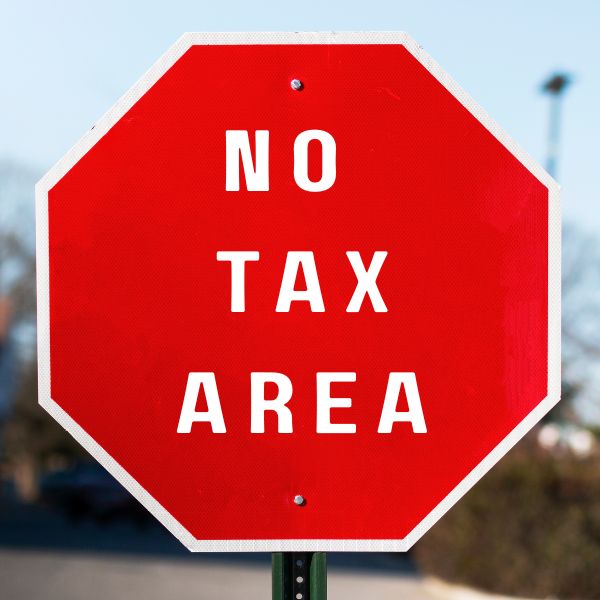
2025: NO TAX AREA (€8500)
The NO TAX AREA applies to anyone receiving a pension, whilst resident in Italy (“pensioner” is defined as someone who is receiving official state benefits i.e., social security or state pension).
No distinction is made between pensions being paid from abroad or within Italy!
The NO TAX AREA is €8500 per annum.
It is important to understand that this is NOT an allowance but a tax credit system.
If your total income (reddito complessivo) is €8500 or less then all the tax payable on your pension will be provided as a tax credit.
HOWEVER, the more your total income, from all sources, increases over €8500, the more of the tax credit you lose.
If your total income is €50000 or above you would not receive any tax credit.
BANK ACCOUNTS AND DEPOSITS
A very simple to understand and acceptable €34.20 per annum is applied to each conto corrente e libretto di risparmio: current account or deposit account. This would typically include fixed deposits, short terms cash deposits, CD’s etc. The charge is the equivalent of the ‘imposta da bollo’ which is applied to all Italian deposit accounts each year.
(Money market accounts, premium Bonds in the UK and other deposit based instruments will not generally fall in this category and would be subject to wealth tax – see below)
Interest income is taxed at 26%.
INVESTMENT INCOME AND CAPITAL GAINS (26%)
A flat tax rate of 26% is payable on interest and income payments from capital and realised capital gains are also taxed at the same rate of 26%.
(Interest from Italian government bonds and government bonds from ‘white list’ countries are still taxed at 12.5% rather than 26%, as detailed above. This is another quirk of Italian tax law as this means that you pay less tax as a holder of government bonds in Pakistan or Kazakhstan, than a holder of corporate bonds from Italian giants ENI or FIAT).
If you are invested in NON-EU harmonised collective investment vehicles i.e. funds which are listed in a place outside the EU, then the gains and income from these assets are NOT taxed at the flat 26% rate in Italy, but would be added to the rest of your income for the year and taxed at your highest marginal rate of income tax! Funds or ETF’s, for example, which re listed in the UK with a GB ISIN code or in the US with an equivalent US number, would fall into this category.
This is particularly important for UK and USA domiciled assets. If you have a brokerage account with a group such as Fidelity or Vanguard or one of the many other asset management firms, or you invest through a platform such as Hargreaves Lansdown in the UK/USA, then depending on which assets you invest in could mean you are pushing yourself into a higher tax bracket on taxable gains and income for the year. Your portfolio may need restructuring for life in Italy!
WEALTH TAX ON ASSETS (0.2% PA)
Any financial assets other than property attract an annual wealth tax of 0.2% on the value of the asset as at the 31st December each year.
Here are examples of a few:
GENERAL INVESTMENT ACCOUNTS, ISAS, BROKERAGE ACCOUNTS, PLATFORMS, DISCRETIONARY MANAGED PORTFOLIO, DIRECT INVESTMENT IN FUNDS, STOCKS AND SHARES, COMMODITIES, ART WORK, CLASSIC CARS, ETC.
If the assets are located in one of tax regimes around the world which are considered fiscally privileged by the Italian authorities, then the rate of tax is 0.4% pa. The list can be found at the end of this article HERE
INCOME FROM OVERSEAS PROPERTY (Income tax rates – IRPEF)
Overseas net property income (after allowable expenses in the country in which is located) is added to your other income for the year and taxed at your highest progressive rate of income tax.
THE WEALTH TAX OF 1.06% ON THE VALUE OF THE PROPERY (IVIE)
For properties based in the EU, the value on which this tax is based is the Italian cadastral equivalent. You will find that the market value will, in most cases, to be significantly more than the cadastral equivalent value. For a list of the different tax values across Europe see the table below.
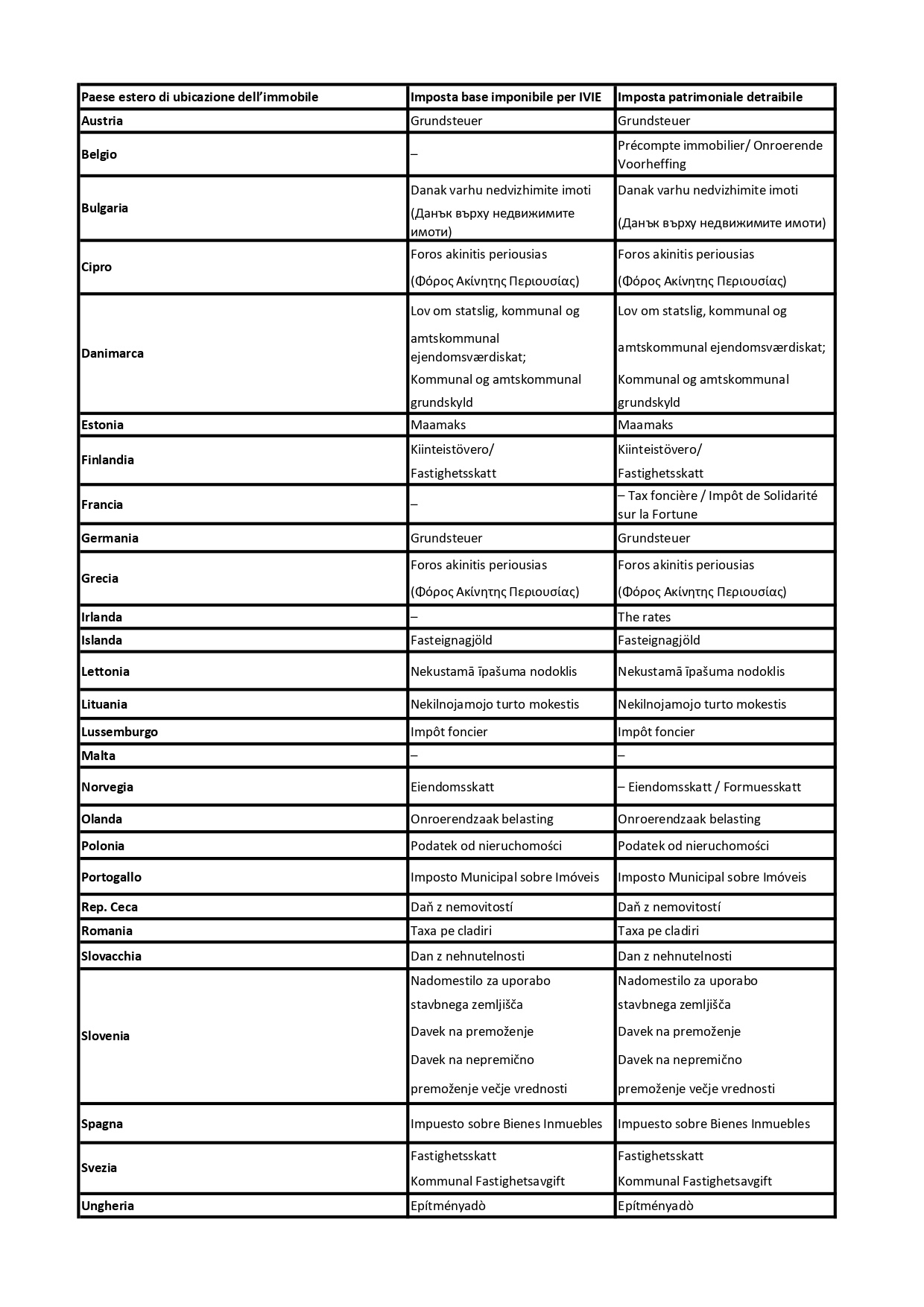
For properties located outside the EU (inc the UK/USA/Canada/Australia/NZ etc) the value for tax purposes is defined as the acquisition value (purchase /inherited/acquired) where this can be evidenced, otherwise it is the current market value of the property.
DISPOSAL OF PROPERTY
Disposal of properties both abroad and in Italy (exc prima casa) are not deemed speculative if you have owned the property for more than 5 full tax years and therefore are not capital gains tax liable on the disposal, in Italy.
NOTE: If you gain residency in Italy then by default your previous ‘first home’ or ‘family home’ for the purposes of the Italian tax authorities is now classified as an investment property. By definition, if you have a home in Italy and a property in another country, even if you consider this property your family home, it can no longer be considered your ‘Prima Casa’ for Italian tax purposes.
If you have any questions about any of these taxes and how they might apply to you and your individual financial situation, or if you think that you might be paying more than need to, then do get in touch and I will be happy to see if I can help you with your plans.
I can be contacted on email: gareth.horsfall@spectrum-ifa.com or on cell: +39 333 6492356
A QUICK UPDATE ON COUNTRY LIFE
The country life update seems to be garnering more interest than the financial talk, given the lovely feedback I have from many of you. I know many of you have already trodden this well worn path of moving to Italian rural homes and are involved in differing degrees with your properties and land management.
I am now slowing down a little bit as the spring has arrived and I see that the plants are literally exploding before my eyes. It seems futile to try and manage it too much when its all growing so quickly. However, it is hard to let go and I do find myself getting up in the morning and just having an hour or 2 on the land before work, or even on the weekend, where it rolls easily into 4 or 5 hours to the extent that my wife finally shouts from the window “Are we ever going to see you this weekend?”. At which point I know my day on the land is over, at least for that day.
Anyway, I know I have been telling many of you that I have refrained from cutting the grass under the olive trees to date. There is now good reason to be careful because as you will see below in the pictures, there are some new occupants of the land and I am a little reluctant to start mowing them down. (I have recently staked around them so I can get on with the grass cutting but without destroying the wild orchids).

I did however want to share a funny story. I bought a trattorino ( ride on lawn mower) in the January sales online, and got quite a good deal on it. However, given the weather had been quite cold up until about a month ago, the grass hadn’t really grown that much and so I put it in storage. I decided to start it up about a week ago, just to see how it went and as you might imagine, it didn’t start.
I was left with my trusty motorized lawnmower. ‘Che fatica!‘ as they say !! The trattorino ride on mower has now been fixed, under guarantee, (it was a broken fuse) and what a difference !!! A HUGE labour savings device.
On another note, I am finally starting, after the winter clean up of the land, to start looking at the border areas and wondering how I can tidy them up as well. A lot of trees and woodland needs to be at least trimmed back and will leave me with lots of material to deal with as always, given I need to do some fencing I was thinking about using this material in some way.
Facebook and social media, almost as soon as I started thinking about it, started pumping out lots of ideas from dead hedges, to woven fences and lots more. I am undecided, but might try my hand at some fence building at some point. It should be fun.
Interestingly, on our annual work and investment conference for The Spectrum IFA Group there has been lots of talk about the impact of Artificial Intelligence, on our lives, in the last few years.
In 2024 we were presented with a list of the jobs most at risk of AI, and those least at risk. At the bottom of the list was fence builder! They didn’t mention that this job might be at risk from Gareth, although the likelihood is that I will give it a try and make a mess and need to call a fence builder in the end, but at least I am guaranteed a nice human conversation instead of wondering if I am talking to an AI application.
This country life certainly has its challenges! I recently was sharing these experiences with someone and finished my emails by saying ‘1st world problems, I guess’. It was only on reflection that I thought that it’s probably one of the types of work that we actually have in common with people wherever they are from on the planet.
I won’t bore you with any more country life tales for this E-zine, but if you have any fence building ideas or want to talk about finances / tax, then please do get in touch!
Trump’s 100 days
Lastly, I thought I would leave you with a piece on Pres. Trump given that he is occupying a significant amount of time with conversations with you, at the moment ( and rightly so)
On April 29th he completed his first 100 days in office and his tone has softened, just slightly, in the last few days.
The article below was sent by one of our collaborative fund manager partners, VAM Funds and I thought I would share it as it’s a succinct article which explains what Trump is trying to do and his potential for success and possible hurdles along the way.
This is not one of my opinion piece’s but instead direct from the financial market people.
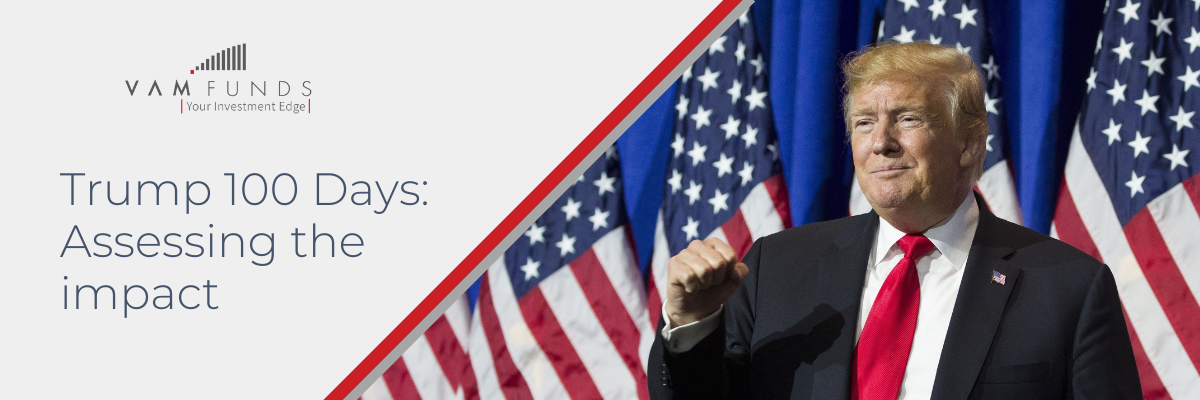
As Donald Trump approaches his first 100 days in office, a complex economic narrative emerges – challenging traditional approaches while attempting to address long-standing structural challenges. His presidency has introduced uncertainty and volatility, yet the broader economic context remains one of relative strength. This dynamic sets the current period apart from prior episodes of market turmoil.
Economic Context
The US faces critical economic pressures: a $2 trillion annual deficit, $36 trillion in national debt, and a declining manufacturing base. Trump’s approach represents an unconventional attempt to reimagine America’s economic positioning – neither entirely destructive nor completely transformative.
Yet, unlike previous periods of market unease, the economy today shows notable resilience. US unemployment remains near historic lows, corporate earnings continue to post positive growth, and balance sheets are broadly solid. Credit markets, while reflecting some spread widening, remain stable and not excessively leveraged. In many ways, the economy itself is not the root of the current turbulence.
The singular variable creating uncertainty is Trump himself. Markets are reacting less to economic fundamentals and more to political risk.
Against this backdrop, Trump’s strategy can be broken down into three core themes that shape his economic agenda:
| Trade Recalibration | Structural Economic Challenges | Economic Repositioning |
| Challenging existing global supply chain dependencies | Addressing long-term fiscal sustainability | Reviving domestic manufacturing |
| Seeking "fair trade" rather than pure free trade | Acknowledging the limits of current economic models | Reducing over-reliance on specific global partners |
| Attempting to redirect, not eliminate, global economic relationships | Proposing radical, and sometimes necessary, interventions | Balancing potential opportunity with heightened geopolitical risk |
Market Dynamics
Investors are navigating a landscape marked by uncertainty, but underpinned by strength. Unlike past episodes where systemic weakness drove market corrections, this time, economic indicators remain broadly constructive.
The real concern is political instability. Trump’s unpredictable tactics have jolted investor confidence, even though the macroeconomic foundations remain intact. However, his motivations are clear: he is ultimately driven to prove that he can build a robust U.S. economy, contain inflation, and secure strategic wins in the global trade arena.
With the 2026 mid-term election cycle beginning as early as Q1/Q2 next year, Trump cannot afford to alienate voters or lose his party’s slim Congressional majority. This political imperative may lead to quick policy “off ramps,” efforts to de-escalate tensions, and the search for visible wins – moves that could rapidly calm markets.
Indeed, any signs of stabilising rhetoric or resolution to current crises may spark an equally swift rebound in both equity and fixed income markets.
Structure in Chaos
Trump’s economic policy is neither pure economic nationalism nor traditional globalism. It is a hybrid approach – an improvised balancing act between disruption and adaptation characterised by:
· Challenging existing economic orthodoxy
· Acknowledging global economic interdependence
· Pursuing strategic economic repositioning
with the following potential outcomes:
· Possible supply chain diversification
· Increased domestic economic resilience
· Risk of short-term market volatility
· Long-term structural economic recalibration
Conclusion
Trump’s first 100 days signal a high stakes experiment in economic leadership. The market’s turmoil is not a reflection of economic collapse but of political unpredictability. Yet, the core economy remains resilient.
Should Trump pivot towards pragmatism – seeking quick wins, stabilising policy narratives, and presenting a clearer economic roadmap – the same markets that reacted sharply to uncertainty may respond just as swiftly to renewed clarity.
When markets turn volatile
By Gareth Horsfall
This article is published on: 10th April 2025

Well, as you might have expected I have decided to write to you at this particularly fragile moment in world politics, and which has now reverberated around world investment markets. As of Friday last week a sell off started in the equity markets which effectively created a bear market situation around the world for fears of global recession based on the Trump tariffs. (as of today we have seena slight rebound, but more volatility is likely)

Given this, you may be forgiven for wondering why I am leading this E-zine with a picture of one of my apple trees in full blossom on my land?
Last weekend I was away from home, spending time in the North of Italy with friends, to celebrate my wife’s 50th birthday. Seeing what had happened on Friday, starting with the sell off in equity markets, I returned home wondering how to deal with it. I could have thrown myself in front of the computer and sent you a lot of charts about how you need to ‘sit tight and ride it through the rises and falls’ or ‘it’s time in the markets that counts not timing the markets’ and ‘the real threat is inflation, not investment market volatility’, (you won’t get away from these points…….you can find these further down the page!), but instead I took an hour in the morning to get my thoughts together and went out on the land to do some tidying up after the olive pruning and to check out the health of the blooming trees.
This apple tree made me take stock of the situation and I will explain why.
When we bought the house last year, the land and house itself had been left abandoned for quite some years and it needed not just a clearing up, but also some TLC. This apple tree was a case in point. Last summer this tree produced 3 very ugly and unhealthy looking apples. The tree itself looked like it had given up the hope and it entered its winter phase looking like it was on its last legs.
I was in 2 minds to pull up the tree and plant something else. However, I thought I would give it another chance, so, I spent the winter pruning the tree and giving it some nutrients. I cut off the bad old rotten wood and reshaped the tree into a form which would allow it space to breath and allow the light to penetrate deep into the centre, so that flowers and fruit could develop.
I was careful not to over do it so as not to stress it too much!!
This, I am happy to say, is the result. What looks like a pretty healthy tree! It is now in full bloom, the bees are all over it and I expect that it may very well provide some decent fruit this year, albeit still quite a young tree.
Comparisons with markets
You will have guessed by now the point I am trying to make about the apple tree. Sometimes, when all hope seems to be lost there may just be hope around the corner with the right care and attention.
I will caveat the rest of this E-zine by stating that I am not wholly against the Trump’s tariffs. I am 100% against the way he is going about it: his morally dubious behaviour, his manner and potentially corrupt allies but we will leave that for another time! I can also kind of understand what he is trying to do, (bringing business back to the US from overseas), but the way he is going about it is nothing short of ludicrous.
In my opinion, what seems to be happening with the Trump’s administration is that there is a pull back from the last 20/30/40 years ( I am not quite sure of the length of time) of globalisation. We are moving more towards nations becoming more protectionist, rather then more global in nature. Is this a bad thing? It’s difficult for me to tell.
Certainly when we look at tariffs, the US has had a reasonably free and open market for most of this time and yet most other nations around the world have not played by the same rules. Free market capitalism works fine when everyone plays by the same rule book and reduces tariffs respectively, but when one plays by one set of rules and another by a separate set of rules, then imbalances are going to arise. I think this is what we are now seeing a push back against. Pres. Trump is saying that the imbalances have been one sided (true or not, I am not at liberty to say) to the detriment of the USA. To some degree I can see his point, although I understand that it is not as black and white as that.

European cars
This morning I saw that Pres. Trump was referencing the fact that European car manufacturers have always had a relatively easy time importing cars into the USA and that the US has lots of BMW’s and Mercedes and VW etc, but that you don’t see many American cars in Europe. On that point he is right. Now, that might be due to the fact that they are too big and we don’t want them, or that they consume so much fuel that they don’t make sense based on the price we pay at the pump, or it could be that there are restrictive trade measures to prevent US cars from entering into the EU market. I don’t know the details but maybe it’s a combination of them all.
Yesterday, I also went to our local Chinese store to get a few bits and pieces and was reflecting on the low prices of goods in these Chinese stores and on the new Chinese online store Temu. Again, I am not an economics expert or even know anything about tariffs between the EU and China, but, just by observation I ask myself why these Chinese goods are so cheap in Europe and yet we have a lack of Italian businesses manufacturing similar goods. Is it that the Chinese are willing to work harder and be paid less to produce the same goods? Have we really sold out EU manufacturing to lower cost countries? Is it tariffs are lower in the EU for Chinese goods than reciprocal tariffs in China, I have no idea but this particular moment in global politics does get me wondering.
If anyone knows please do feel free to let me know!
My point is, what if Trump is right? What if there are imbalances in world trade that need to be corrected and this is the way to do it? What if it can reindustrialise the USA?
(I very much doubt this by the way as I saw a list of companies who have announced significant investment and manufacturing in the USA since this trade war started and they are mainly AI firms and manufacturers of high level semiconductors etc. These firms are very unlikely to need rust belt workers to work in factories where they are more reliant on robotics and highly sophisticated machinery. That being said, bringing back the production of essential computer components for industry and defence also has some merit).
However, to give him the benefit of the doubt, what if there is some merit in taking short term pain to try and achieve long term gain?
If Pres. Trump can pull even a small % of manufacturing from China to the USA and create more national independence on its goods and services, and improve national security , may he have achieved his goal? It does feel like an end of empire last grasp at power, scenario, but maybe this will mean that the USA can retain it’s No 1 global economic powerhouse status for some time to come.

Markets speak in the US
So moving away from my random hypotheses, let’s dwell on markets and the horrible news that our portfolios have fallen in value once again but, before I do, if you have been an investor for years, I would ask you to reflect on just the last 5 years for a moment.
What did you think when a global pandemic hit? Businesses were shut, schools too, everyone was told to stay at home and not interact with each other without a mask on and to stay 6 metres away from others? The markets tanked as a result.
What was your reaction? Maybe we were too distracted by the pandemic to really pay much attention – and rightly so! but what about when Russian invaded Ukraine and it sent global markets into a panic and a global inflation spike, sending us from years of disinflation and near zero interest rates, to an overnight significant rise in prices which to date continues. Did you panic sell off your portfolio?
Probably the answer is no and you did the right thing because markets rebounded (albeit more slowly after the Russia Ukraine war) but they did and the same happened after 2008 Financial Crisis and 2010 Euro crisis: hanging on and riding through the panic was the best thing to do… and it is now!
You might argue ‘It’s different this time’ ; the whole world is changing and markets will never recover. If you think this then I would coach you to read the book, ‘It’s different this time -Eight Centuries of Financial Folly’ by Reinhart and Rogoff. Largely financial markets are governed by human behaviour and that has not changed since time began, or at least over the last 8 centuries according to the data they present.
Please also bear in mind that success for every US President is judged on the US stock market. Most, if not all Americans, have significant assets invested in the US stock market and so it is a sign of health of the US economy and more importantly a measure of the US Presidents success at home ( interestingly, Pres. Trump’s favourability ratings have increased from 48% at election time to 53% now. clearly, he is increasingly approved of in the USA).
After reading so much on this topic and trying to syphon through the almost hourly noise, my view is that he is front loading all the bad news now to get it out of the way. He knows that come the mid-terms in 2026 he needs to have made significant inroads into making good on his promises to the American people and for that reason he is getting the worst out of the way now, whilst he can, after which a flurry of good news will likely follow.

Trump’s strategy
So, moving away from the media hype and screaming economists for a moment, let’s take a look at what Pres. Trump is really trying to achieve.
Pres. Trump watches consumer confidence closer than anything and in order to keep it high he has to achieve 3 goals:
1. Get oil prices lower
Gas at the pump is the beating heart of the America middle class and the Trump administration will go to any lengths to reduce the price of oil at the pumps. (When I was in New York in February the gas at the pump, I calculated, cost €1 a litre!!!!!!! – compare that to the the €1.59 a litre, this morning, that I just paid for diesel. Petrol was €0.20 higher still). So, if this administration can reduce gas prices further that could stimulate a mini economic boom in the US.
Bear in mind that the US is already the worlds largest producer of oil at 40% higher than its nearest competitor ( Saudi Arabia). Pres. Trump has stated clearly that he wants to aim for 100% energy independence and I think they will not just aim for it but do it at any cost.
(It should be noted that I paid €1.59 a litre for diesel this morning. 1 week ago it was €1.67. – Is his strategy working?)
2. Mortgages are the second lever to pull
If he wants the American public to gain confidence in his policies then he needs to give them breathing room economically (i.e. more money in their pockets) and he can then continue to go about reshaping the US economy . (At time of writing, with pressure building on a possible recession, pressure is equally being heaved on Jerome Powell – head of the Federal Reserve, to reduce interest rates). Was the market correction manufactured to some degree, or at least expected, to pressure the Fed to reduce interest rates?
This administration has also openly stated that they will also look to deregulate the banking industry, to release them from overly administrative and bureaucratic procedures and to allow them to get back to banking. This will also assist in bringing interest rates down. (This point I can fully agree with :banking regulation, anti money laundering legislation, source of wealth and origin of wealth obligatory requirements have become, quite frankly , out of control and any simplification in this regard, in my opinion, is warranted).
3. Lastly – the Trump administration will focus on food price inflation
Remember to watch out for the first 100 days of the Pres. Trump term which is often linked to his early successes; the 100th day lands on April the 29th!
So, there you have it, a few thoughts of my own on the Trump administration and why it might not be as bad as it seems.
So, let me turn to the technical for a moment: some data about market volatility.
The data below courtesy of one of our investment management partners, New Horizon Investment Management.
When markets turn volatile, perspective is everything
This market volatility feels tumultuous but, of course, we’ve been here before. The table below reveals that after severe drawdowns, the market has often recovered the full decline and finished the year strongly positive.

Years to Note:
- 1970: Market fell -26% from peak to trough… yet ended +3.6%
- 1975: Dropped -14.1%, but closed the year up +37%
- 1987 (Black Monday): Down -33.5% mid-year, still finished +5.8%
- 2009: Deep in the Global Financial Crisis, dropped -27.6%, yet ended +26.5%
- 2020: COVID crash brought a -33.9% drawdown… ended +18.4%
On each occasion, the best course of action would have been to avoid the noise and stay invested.
“History doesn’t repeat itself, but it often rhymes.” – Mark Twain
Whatever happens in the market we have bigger things to worry about!
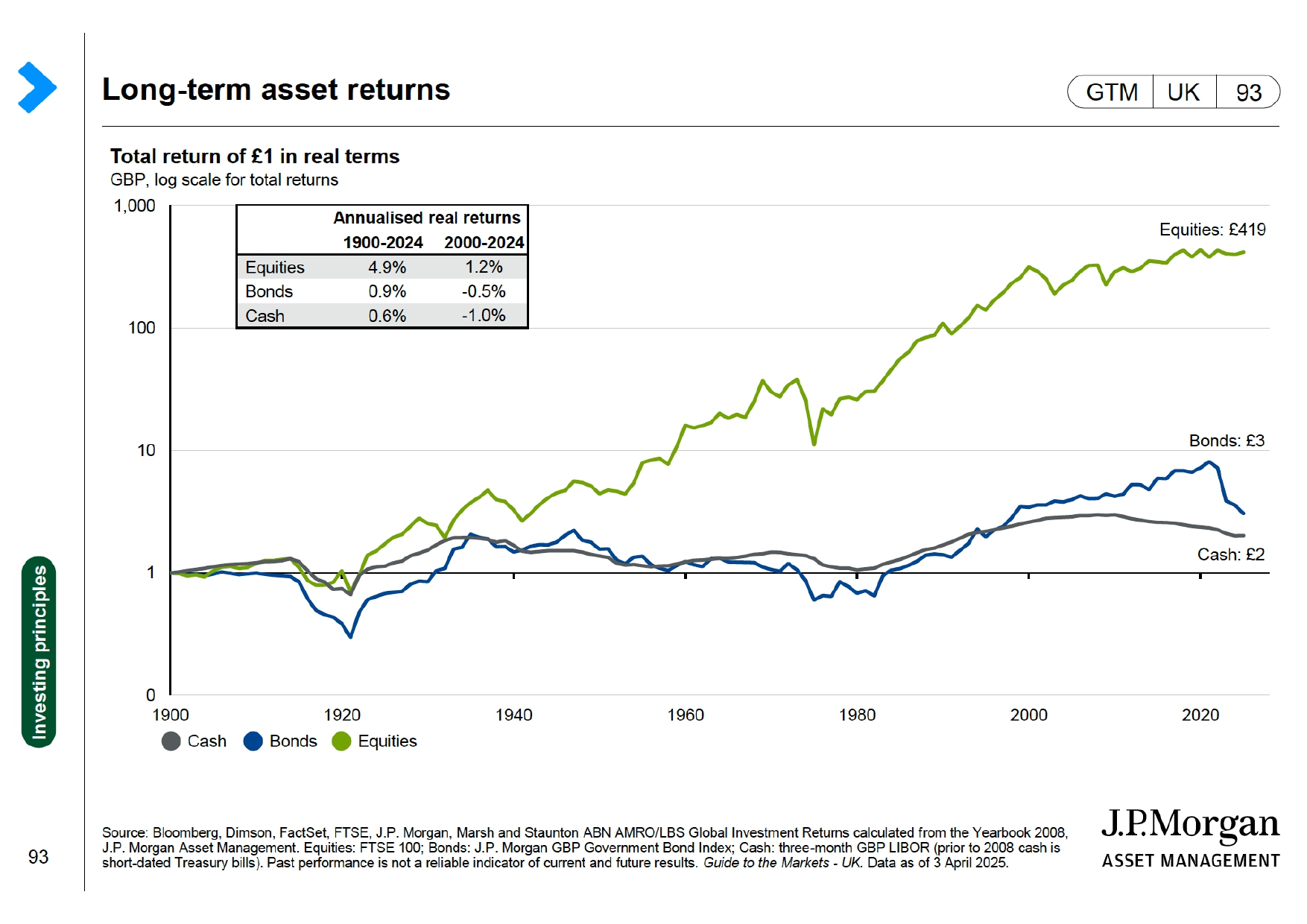
Besides, when markets sell off, why on earth would you not buy into them at these prices? They are at bargain basement prices and as the saying goes ‘fill your boots!’ I had a measly amount of cash available to invest and have taken advantage of these prices.
Let me tell you a couple of my own investment tales:
My first tale which I have written about before was during the financial crisis of 2008 ( which by the way was a many times worse than what we are going through today) and my wife had just sold a house in the UK and we had some cash to invest. I knew I had to invest but I was very nervous because, working at the coal face of what was happening at that time, I knew that things were very serious. However, I also knew the theory of markets and that the best time to buy was in the height of the chaos. I went for it and the next 3 months were tragic and I lost 20% in value on the portfolio. (I never told me wife!) 6 months later the portfolio was up 45% ! It should be noted that I am an adventurous investor profile and so was invested 100% in equity ; it was a wild ride I can tell you but I knew the logic and I just had to be patient. Later we needed that money for something else and had to sell a sizeable portion of it, but it did its job.
My other tale is that at the start of my career as a financial planner I thought I was smarter than the market itself and that I could time my way in. I waited and waited and…. waited for the right entry point, waiting for a decent correction to buy in at the price I deemed to be right. I arrogantly waited 6 years before buying in! (What an idiot!) I can’t even bring myself to calculate the gains that I missed in those 6 years even with the correction that happened.
Lesson: It’s time in the markets, not timing the markets, that counts…
As I said to someone recently “I have made all the mistakes in the books, so you don’t have to!”

Inflation
Finally, let’s talk about inflation. Here I take the words of Charles D Ellis who wrote the book ‘Winning the Losers Game – Timeless strategies for successful investing’.
“For individual investors, inflation has usually been the major problem – not the attention getting daily or cyclical changes in security prices that most investors fret about. The corrosive power of inflation is truly daunting. At 5% inflation the purchasing power of your money is cut in half in less than 15 years and cut in half again in the next 15. At 7% your purchasing power drops to 25 % of its present level in just 21 years- the elapsed time between early retirement at age 61 and age 82, an increasingly normal life expectancy“.
Again, it might be useful to provide some perspective here because the all so surreptitious march of inflation is often upon us when we notice it, by which time it is far too late to do anything about it.
1. The price of my journey to Rome on the autostrada from Orte has increased from €4.50 in 2024 to €4.80 in 2025. That’s a 6.6% increase. I track this price and it has never, in my 20 years in Italy, increased at inflation levels or under. Always above!
2. The water machine in central Amelia, where I go to fill our drinking water bottles was 5 cents for a litre and half, they have just changed the machine and it’s now 5 cents a litre. That’s a 33.3% increase. (It’s hardly breaking the bank but a great example)
3. The news on RAI announced a few nights ago that the price of Colomba Easter cake is up 31% year on year and Easter eggs up 26%.
4. I took my son to KFC 2 weeks ago, reluctantly, and asked for the 4 large pieces of chicken. The last time I went to KFC was about 15 years ago and I remember these 4 huge pieces of chicken. Now, the 4 pieces resembled the size of 4 larger nuggets. Shrink inflation in practice so if you can’t increase your prices, reduce the amount of product. It has the same effect !
OK, I hear you say ‘These are not everyday items’ but they do reflect the general trend of the stealthy march of inflation.
Be under no illusion that this is your main financial enemy and investing is your only tool to protect yourself from it!
Investing requires patience and courage…or a financial adviser who you can ring and let off some steam. Make sure you can tap into any of these things if you get concerned about world events and market volatility!
So, on this happy point let me leave you with this information about the life ahead of you.
Life Expectancy
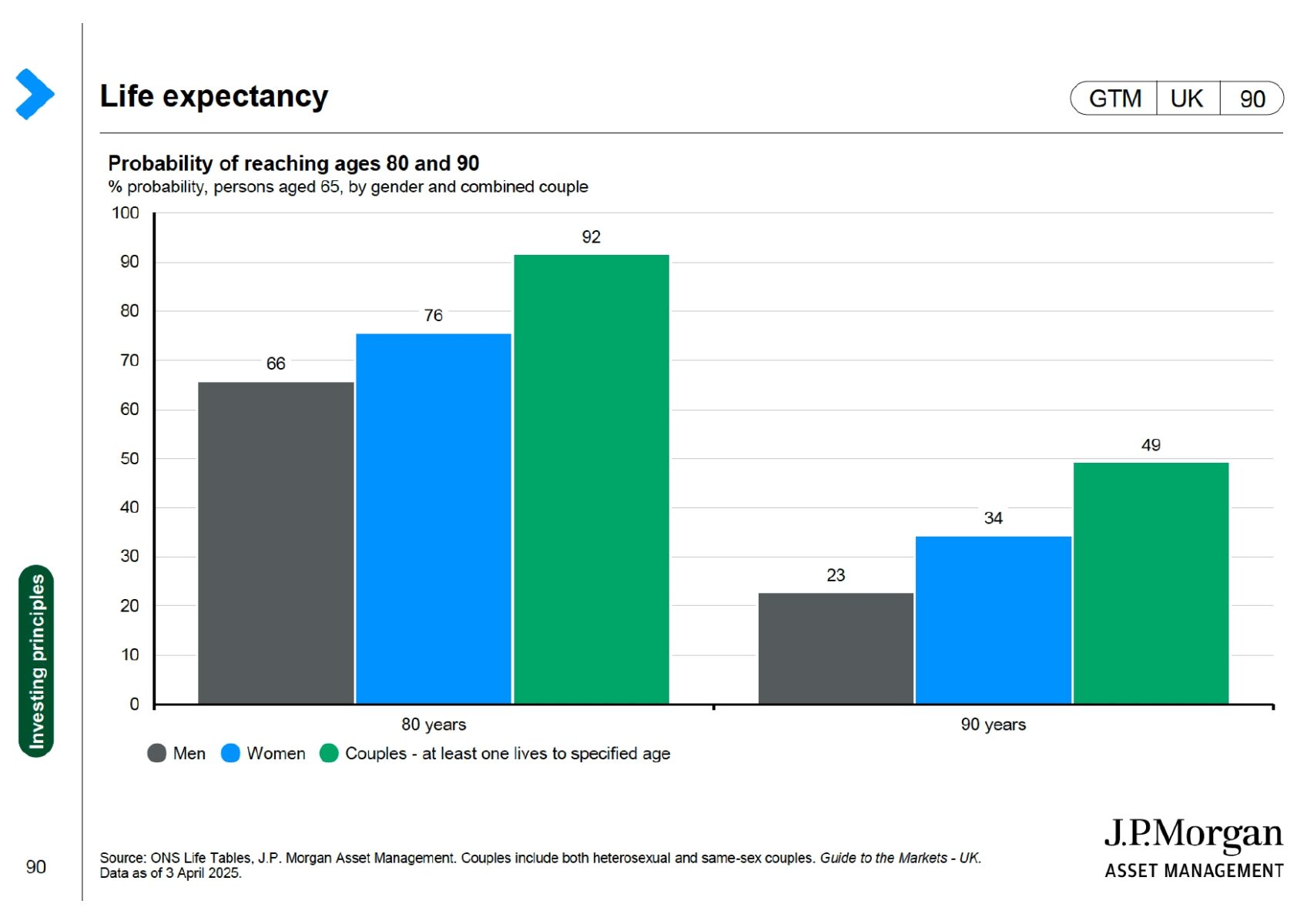
More people needing to finance live beyond 90th birthday
- Ratio of women over age 90 to men was about 2:1 in 2023
- The number of people aged 90+ has doubled over the last 30 years
- The ratio of women over age 90 to men was 2:1 in 2023 compared to 4:1 in the 1980’s. About one in every 100 people is now aged at least 90.
- The odds of living to beyond 90 are high enough that people shouldn’t assume it can’t happen to them. Historically, this has been mainly women but the numbers of men are catching up fast.
- For those who are age 66 this year there is about a one in 3 chance (33%) for men and nearly an evens chance (46%) for women of making it to at least age 90 and if they do get to age 90 there is nearly an even chance they will survive to beyond 9%
The message: Think long term and not Donald Trump term!
If you would like to let off some steam with me or discuss any of what is going on in the world, tax or financial planning related issues in Italy then please don’t hesitate to contact me on: gareth.horsfall@spectrum-ifa.com or call / message on +39 3336492356
Always happy to help where I can!



